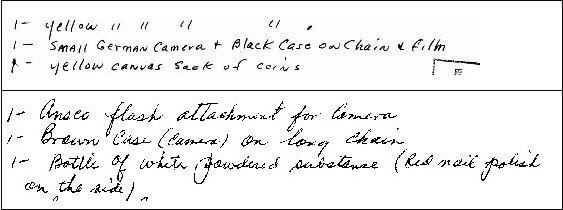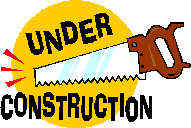
Was Oswald really a Spy for the United States Government?
HSCA EXECUTIVE SESSION
ASSASSINATION OF PRESIDENT JOHN F. KENNEDY
WEDNESDAY, MARCH 22, 1978
House of Representatives,
John F. Kennedy Subcommittee
of the Select Committee on
Assassinations,
Washington, D. C.
The subcommittee met at 10:20 a.m., pursuant to notice,
in room 2344 of the
Rayburn Office Building, the Honorable
Richard Preyer
(Chairman of the subcommittee), presiding.
Present: Representatives Preyer (presiding), Dodd and
Sawyer.
Also Present: Michael Goldsmith, Counsel, and Gary
Cornwell, Counsel.
Also Present: Elizabeth Berning, Chief Clerk, and
Charles Berk, Betsy
Wolf and James Wolf.
Mr. Preyer. Thank you for being here today, and I will
call the subcommittee
to order at this time.
I will ask if you will stand and be sworn.
Do you solemnly swear that the evidence you are about
to give before this
subcommittee will be the truth, the
whole truth and nothing
but the truth, so help you God?
Mr. Wilcott. I do.
Mr. Preyer. I would like before we begin to read a
written statement
concerning the subject of the investigation.
We are operating under House Resolution 222, which man-
dates the
Committee to conduct a full and complete investi-
gation and
study of the circumstances surrounding the assas-
sination
and death of President John F. Kennedy, including
determining
whether the existing laws of the United States
concerning
the protection of the President and the investiga-
tory
jurisdiction and capability of agencies and departments
are
adequate in their provisions and enforcement; and whether
there was
full disclosure of evidence and information among
agencies
and department of the United States Government and
whether any
evidence or information not in the possession of
an agency
of department would have been of assistance in
investigating the assassination and why such information was
not
provided or collected by that agency or department, and
to make
recommendations to the House if the Select Committee
deems it
appropriate for the amendment of existing legislation
or the
enactment of new legislation.
That is what we are attempting to accomplish, which is
quite a big
order.
We appreciate your being here today, Mr. Wilcott.
(Whereupon, a recess was taken while the members of the
Committee
went to the floor of the House for a vote.)
3
Mr. Preyer. We will come to order.
We will resume the session, and I will recognize Counsel
to begin his
questioning.
TESTIMONY OF JAMES B. WILCOTT, A FORMER EMPLOYEE
OF THE CENTRAL INTELLIGENCE AGENCY:
Mr. Goldsmith. For the record, would you please state
your name and address
and occupation?
Mr. Wilcott. My name is James B. Wilcott. My address
is 2761 Atlantic
Street, in Concord, and my occupation is
electronic technician.
Mr. Goldsmith. Where is Concord located?
Mr. Wilcott. It is a little bit east of Oakland,
California.
Mr. Goldsmith. Have you received a copy of the
Committee's rules?
Mr. Wilcott. Yes.
Mr. Goldsmith. And a copy of the relevant House
Resolutions?
Mr. Wilcott. Yes.
Mr. Goldsmith. And, Mr. Wilcott, is it true that you
are a former
employee with the CIA and that you are here
today testifying
voluntarily without a subpoena?
Mr. Wilcott. Yes.
Mr. Goldsmith. During what years did you work for the
CIA?
4
Mr. Wilcott. I worked from the years, May, of 1957 to,
April, of 1966.
Mr. Goldsmith. And in what general capacity did you
work with the CIA?
Mr. Wilcott. All in the finance -- in accounting all
of the time.
Mr. Goldsmith. How did you become employed with the CIA?
Mr. Wilcott. I was recruited from the school in Syracuse
New York, where I was
taking a course in accounting and busi-
ness administration.
Mr. Goldsmith. Very generally now, what were your
responsibilities as a
finance employee with the agency?
Mr. Wilcott. Well, from May of 1957 to January of 1960 -
Mr. Goldsmith -- excuse me, just answer the question
very
generally, without referring to anything right now, and
please
describe generally what your responsibilities were as
a finance
officer.
Mr. Wilcott. My. responsibilities were primarily record
keeping and
disbursing of funds.
Mr. Goldsmith. Mr. Wilcott, are you here with Counsel
today?
Mr. Wilcott. Yes, I am.
Mr. Goldsmith. Would your Counsel identify himself
for the
recorder?
Mr. Schaap. My name is William Schaap, S - c - h - a -
5
a - p (spelling), and I
am an Attorney here in Washington.
I will give my card to the Committee.
Mr. Goldsmith. Mr. Wilcott, did I ask you to prepare
a list indicating the
dates that you were employed with the
CIA and where you were
stationed?
Mr. Wilcott. Yes, you did.
Mr. Goldsmith. Did you prepare such a list?
Mr. Wilcott. Yes, I did.
Mr. Goldsmith. Do you have that list with you?
Mr. Wilcott. Yes. I do.
Mr. Goldsmith. Referring to that list, would you tell
the Committee where you
were stationed during your period with
the CIA?
Mr. Wilcott. Certainly, from May of 1957 to January of
1960, I was
in the pre-fab building on the Potomac in finance.
During the
period, it was unvouchered funds, and my duties
were
general accounting, and my rate in status was GS-5.
From about January of 1960 to about June of 1960, I
was
transferred to Finance Field Payroll, also, in this same
building,
on the Potomac. This was making payments and
keeping pay
records.
From June of 1960 to June of 1964, I was stationed at
XXXXXXX
Station, and my primary duty was finance and cash
disbursements. This was all cash payments and record keeping
for the
station. And during that period, I had been promoted
6
GS-7 and also gained a
career status.
From June of 1964 to about December of 1964, I was at
Roseland. This
was just prior to moving to Langley, in
finance, and my duties
there were policing accounts, and
included auditing of
special accounts.
From January of 1965 to about March of 1965, I was at
Langley in the same
area, in finance, policing accounts and
auditing of special
accounts, and I was promoted up to GS-9.
From April of 1965 to April of 1966, I was at Miami
Station in finance, and
I was handling the staff payroll.
This was preparing and
reconciling payrolls.
In April of 1966, I resigned from the CIA.
Mr. Goldsmith. I take it, from your testimony, that
in November
of 1963, you were stationed in XXXXXXXXXXXXX
Station, is
that correct?
Mr. Wilcott. That is right.
Mr. Goldsmith. Drawing your attention to the period
immediately
after the assassination of President Kennedy,
at that
time, did you come across any information concerning
Lee Harvey
Oswald's relationship with the CIA?
Mr. Wilcott. Yes, I did.
Mr. Goldsynith. And will you tell the Committee what that
relationship was?
Mr. Wilcott. Well, it was my understanding that Lee
Harvey Oswald was an employee of the agency and was an agent
of
the agency.
Mr.
Goldsmith. What do you mean by the term "agent"?
Mr. Wilcott. That he was a regular employee, receiving
a full-time salary for
agent work for doing CIA operational
work.
Mr. Goldsmith. How did this information concerning
Oswald first come to
your attention?
Mr. Wilcott. The first time I heard about Oswald being
connected in any way
with CIA was the day after the Kennedy
assassination.
Mr. Goldsmith. And how did that come to your attention:
Mr. Wilcott. Well, I was on day duty for the station.
It was a
guard-type function at the station, which I worked
for
overtime. There was a lot of excitement going on at the
station
after the Kennedy assassination.
Towards the end of my tour of duty, I heard certain
things
about Oswald somehow being connected with the agency,
and I
didn't really believe this when I heard it, and I
thought it
was absurd. Then, as time Went on, I began to
hear more
things in that line.
Mr. Goldsmith. I think we had better go over that one
more time.
When, exactly, was the very first time that you heard
or came
across information that Oswald was an agent?
Mr. Wilcott. I heard references to it the day after
8
the assassination.
Mr. Goldsmith. And who made these references to Oswald
being an agent of the
CIA?
Mr. Wilcott. I can't remember the exact persons. There
was talk about it going
on at the station, and several months
following at the
station.
Mr. Goldsmith. How many people made this reference
to Oswald being an
agent of the CIA?
Mr. Wilcott. At least -- there was at least six or
seven people,
specifically, who said that they either knew
or believed Oswald to
be an agent of the CIA.
Mr. Goldsmith. Was Jerry Fox one of the people that
made. this
allegation?
Mr. Wilcott. To the best of my recollection, yes.
Mr. Goldsmith. And who is Jerry Fox?
Mr. Wilcott. Jerry Fox was a Case Officer for his branch
the Soviet
Russia Branch, XXXXXXXXXX Station, who purchased
information
from the Soviets.
Mr. Goldsmith. Mr. Wilcott, did I ask you to prepare
a list of
CIA Case Officers working at XXXXXXXXX Station in
1963?
Mr. Wilcott. Yes, you did.
Mr. Goldsmith. Did you prepare such a list?
Mr. Wilcott. Yes, I did.
Mr. Goldsmith. Is that list complete and does it have
9
every CIA Case Officer
who worked XXXXXXXXXX in 1963?
Mr. Wilcott. Oh, no. It doesn't have every one. It
has every one that I
can remember.
Mr. Goldsmith. Did you bring that list with you today?
Mr. Wilcott. Yes, I did.
Mr. Goldsmith. Were any of these people on your list
possible subjects who
made references to Oswald being a CIA
agent?
Mr. Wilcott. Yes.
Mr. Goldsmith. Would you read the list to the Committee?
Mr. Wilcott. Yes.
Mr. Goldsmith. Only of Case Officers.
Ms. Berning. I think we ought to state that the record
shows that Mr. Sawyer
is a member of the Kennedy Subcommitte
Preyer. We will.
Mr. Goldsmith. Upon your memory and the list that your
brought
with you today, will you tell the Committee the names
of the CIA
Case Officers who you remember working XXXXXXXXXX
in 1963?
Mr. Wilcott. Yes. There was XXXXXXXXXXXX Branch,
who had
XXXXXXXXXXX cover.
Jerry Fox, SR Branch, Soviet Russia Branch --
Mr. Goldsmith. Excuse me, please proceed very slowly.
Mr. Wilcott. Jerry Fox, SR Branch, Reid Dennis, Chief
of
Soviet Satellite Branch; and XXXXXXXXXX, China Branch,
10
and he also had a
cover.
John P. Horton, XXXXXXXXX Section; XXXXXXXXXXXXX
Branch; and Chester
Ito, XXXXXXXXX Branch; and Kan Takai, XXXXX
Branch; and Jim
Delaney, China Branch; and Bob Rentner, SR
Branch -- and there is
some question about that, the branch
he was with.
Larry Watanabi, XXXXXX Branch, Senior Case Officer; and
XXXXXXXXXXX, deep
commercial cover agent.
There was a person, Dave, who was a Deputy Chief.
Dave -- I can't
remember his last name, Deputy Chief of the
China Branch; and then
a person whose last name was XXXXXXXXX
in the XXXXXXXXX
Branch.
Mr. Goldsmith. Do you remember which of these individuals
if any,
made the specific allegation or reference that Oswald
was an
agent?
Mr. Wilcott. It has been 15 years, and I can't remember
specifically who said what, but certainly I am sure that Jerry
Fox, for
instance, had at least made some mention of it.
Mr. Goldsmith. At the time that this allegation first
came to
your attention, did you discuss it with anyone?
Mr. Wilcott. Oh, yes. I discussed it with my friends
and the
people that I was associating with socially.
Mr. Goldsmith. Who were your friends that you discussed
this
with?
Mr. Wilcott. XXXXXXXXXXXX George Breen, Ed Luck, and
11
XXXXXXXXXXXXX.
Mr. Goldsmith. Who was George Breen?
Mr. Wilcott. George Breen was a person in Registry,
who was my closest
friend while I was in XXXXXXXXXXXXXX.
Mr. Goldsmith. Was he a CIA employee?
Mr. Wilcott. Yes, he was.
Mr. Goldsmith. And would he corroborate your obser-
vation that Oswald was
an agent?
Mr. Wilcott. I don't know.
Mr. Goldsmith. At the time that this allegation first
came to
your attention, did you learn the name of Oswald's
Case
Offficer at the CIA?
Mr. Wilcott. No.
Mr. Goldsmith. Were there any other times during your
stay
with the CIA at XXXXXXXXXX Station that you came across
information that Oswald had been a CIA agent?
Mr. Wilcott. Yes.
Mr. Goldsmith. When was that?
Mr. Wilcott. The specific incident was soon after the
Kennedy assassination, where an agent, a Case Officer -- I
am
sure it was a Case Officer -- came up to my window to draw
money, and he specifically said in the conversation that
ensued, he specifically said, "Well, Jim, the money that I
drew
the last couple of weeks ago or so was money," either
for
the Oswald project or for Oswald.
12
Mr. Goldsmith. Do you remember the name of this Case
Officer?
Mr. Wilcott. No, I don't.
Mr. Goldsmith. Do you remember when specifically
this conversation took
place?
Mr. Wilcott. Not specifically, only generally.
Mr. Goldsmith. How many months after the assassination
was this?
Mr. Wilcott. I think it must have been two or three
omths (sic) after the
assassination.
Mr. Goldsmith. Do you remember where this conver-
sation took place?
Mr. Wilcott. It was right at my window, my disbursing
cage
window.
Mr. Goldsmith. Did you discuss this information with
anyone?
Mr. Wilcott. Oh, yes.
Mr. Goldsmith. With whom?
Mr. Wilcott. Certainly with George Breen, XXXXXXXXXXX
the
circle of social friends that we had.
Mr. Goldsmith. How do you spell XXXXXXXXXX last name?
Mr. Wilcott. XXXXXXXXXXXXX (spelling).
Mr. Schaap. For the record, I have made a list of all
of these
spellings of the names which have been mentioned,
which I
will give to the stenographer so that he will have
13
them correctly.
Mr. Goldsmith. Did this Case Officer tell you what
Oswald's cryptonym was?
Mr. Wilcott. Yes, he mentioned the cryptonym specifically
under which the money
was drawn.
Mr. Goldsmith. And what did he tell you the cryptonym
was?
Mr. Wilcott. I cannot remember.
Mr. Goldsmith. What was your response to this revelatic
as to what Oswald's
cryptonym was? Did you write it down or
do anything?
Mr. Wilcott. No; I think that I looked through my
advance
book -- and I had a book where the advances on projects
were run,
and I leafed through them, and I must have at least
leafed
through them to see if what he said was
true.
Mr. Goldsmith. And are you saying then that you attempted
to
investigate this allegation?
Mr. Wilcott. No, I am not saying that. It was more of
a casual
kind of thing, to my way of thinking.
Mr. Goldsmith. Did you check your cash disbursement
files?
Mr. Wilcott. Not the files, no.
Mr. Goldsmith. I am not sure I am following, then, what
specifically you did check.
Mr. Wilcott. It was a book that I had. At the end of
14
the day we would list
all of the advances that were made in
an advance book.
It was just a three-ring binder, and we
would list down the
advances by cryptonym and the amounts
and then reconcile that
with the daily disbursements.
Mr. Goldsmith. How long were these records maintained?
Mr. Wilcott. They were maintained on a thirty-day
basis, and then they
were closed off at the end of the month.
Mr. Goldsmith. So, does that mean you were able to check
back only thirty days
from the time that you were given this
information?
Mr. Wilcott. Yes.
Mr. Goldsmith. I realize this is testimony 15 years
after the fact.
However, if you received this information
two or three months
after the assassination, at a time that
Oswald was already dead
and had been dead for two or three
months, what purpose
would have been served by checking
records that were only
30 days old?
Do you follow the question?
Mr. Wilcott. No.
Mr. Goldsmith. Well, in other words, if you got the
information three
months after the assassination, Oswald had
already been dead
for three months, is that right?
Mr. Wilcott. Yes.
Mr. Goldsmith. Answer "yes" or "no" for the recorder.
Mr. Wilcott. Yes.
15
Mr. Goldsmith. You testified that your records were
only kept for thirty
days, is that correct?
Mr. Wilcott. Yes.
Mr. Goldsmith. Then, by checking your records, which
only went back thirty
days, isn't it true that you wouldn't
have gotten any
information concerning Oswald anyway because
Oswald had already been
dead for one or two months?
Mr. Wilcott. That is true.
Mr. Goldsmith. So, then, really, no purpose would have
been served by checking
those records?
Mr. Wilcott. That is right.
Mr. Goldsmith. And did you check any other records?
Mr. Wilcott. No.
Mr. Preyer. I understand this might be a good place
for us to break and go
and vote, so that we will take another
recess for about ten
minutes. I am sorry.
(Whereupon, a recess was taken while the members of
I the Committee went to
the floor of the House for a vote.)
Mr. Preyer. The Committee will resume.
Mr. Goldsmith. Mr. Wilcott, you indicated that after
receiving this
information concerning Oswald's cryptonym, you
went back to check some
files, is that correct?
Mr. Wilcott. Not really files; it was my book.
Mr. Goldsmith. Your book.
Mr. Wilcott. I flipped through it.
16
Mr. Goldsmith. What is the name of the book?
Mr. Wilcott. It was my Request for Advance Book.
Mr. Goldsmith. And for purposes of clarification, now,
if Oswald was already
dead at the time that you went to this
book, why did you go
back to examine the book?
Mr. Wilcott. Well, I am sorry -- if Oswald was what?
Mr. Goldsmith. At the time you went to look at the
book, Oswald was
already dead is that correct?
Mr. Wilcott. That is right.
Mr. Goldsmith. Why did you go back to look at the
book?
Mr. Wilcott. Well, the payments that were made especially
to substations like
Oswald's was operated -- it was a sub-
station of the XXXXXXXX
station, and they had one in XXXXXX
and they had one in
XXXXXXXXX-- and it may be six months or
even a year after the
intial allocation that the final
accounting for those
funds were submitted, and they would
operate out of
revolving funds or out of their own personal
funds in many cases.
Mr. Goldsmith. So, is your testimony then that even
though.
Oswald was already dead at that time, the book might
have
contained a reference to either Oswald or the Oswald
project and
that that reference would have been to a period
six months
or even a year earlier, is that correct?
Mr. Wilcott. That is correct.
17
Mr. Goldsmith. Mr. Wilcott, how long were these advance
books retained?
Mr. Wilcott. They were retained for approximately one
year by the finance
office, approximately one to two years,
and were destroyed at
the time of audit.
Mr. Goldsmith. So that they would be routinely destroyed
at the time of
auditing?
Mr. Wilcott. Yes.
Mr. Goldsmith. Did you check any of the earlier books?
Mr. Wilcott. No,
I didn't, as far as the Oswald crypto-
nym was concerned; no,
I didn't.
Mr. Goldsmith. So basically, you checked only one of
the advance
books, is that correct?
Mr. Wilcott. My current one that I had on my counter.
Mr. Goldsmith. And when you testified earlier that you
learned
Oswald's cryptonym, by that do you mean that you
learned
both Oswald's personal cryptonym and his project
cryptonym,
or was it one of the two?
Mr. Wilcott. Well, it was just a cryptonym, and it
could refer
to a person, or it could refer to something else
and I would
have no way of knowing what a cryptonym referred
to.
Mr. Goldsmith. So, when the officer told you -- strike
that.
So, when the Case Officer made reference to a cryptonym
18
you didn't know whether the cryptonym referred to Oswald
specifically or to a
project in which Oswald had been involved
is that correct?
Mr. Wilcott. Yes, sir.
Mr. Goldsmith. Mr. Wilcott, assuming that Oswald had
been employed as an
agent by the CIA, would there have been
a reference to that
fact in the CIA's cash disbursement file?
Mr. Wilcott. No.
Mr. Goldsmith. Why not?
Mr. Wilcott. Anything they had there would have --
sometimes they used as
many as two or three different crypto-
nyms and they would
have -- it all depended on how far they
wanted to isolate it
from the original source, from the
original source as to
where the project was run.
Mr. Goldsmith. But as a matter of routine, would the
CIA cash disbursement files
refer to the cryptonym of either
the person or the project
that is receiving funds?
Mr. Wilcott. Yes, I am sure somewhere.
Mr. Goldsmith. As a matter of routine, there would be
that reference?
Do you believe that there was such a reference
to Oswald?
Yes, I do, and I believe there was such a reference.
Mr. Goldsmith. Well, if I understand your correctly,
then, you answer
now was somewhat different from what you
testified
earlier. And I will ask the question again, okay
19
Mr. Wilcott. Yes.
Mr. Goldsmith. Assuming that Oswald was an agent for
the CIA, would the
agency's cash disbursement files have
referred to either
Oswald or to his cryptonym?
Mr. Wilcott. Yes.
Mr. Goldsmith. And you have had access to the cash
disbursement files at
XXXXXXXXXXXXX Station?
Mr. Wilcott. Yes, for a limited period.
Mr. Goldsmith. Were you ever able to check those par-
ticular files?
Mr. Wilcott. I was able to but I never did.
Mr. Goldsmith. So, you never checked the cash disburse-
ment files to see if
any reference was made there to Oswald's
cryptonym, is that
correct?
Mr. Wilcott. That is right. It was only my personal
files -- my internal
files, prior to the end of the month.
Mr. Goldsmith. I understand.
How long were the XXXXXXXXX cash disbursement files or
records retained?
Mr. Wilcott. The details approximately two years. We
had accountings, or we
had audits about every two years,
and then then files
that I kept the requests for advances,
the details of the
accountings that were done usually on a
monthly basis by the
XXXXX Station Branches, would be destroyed
and then they would be
-- and, in fact, I helped destroy them.
20
Mr. Goldsmith. Are you saying, then, that the cash
disbursement files as a
matter of routine would be periodically
destoryed? (sic)
Mr. Wilcott. Yes.
Mr. Goldsmith. Do you know whether CIA Headquarters would
have had either copies
or originals of the cash disbursement
files?
Mr. Wilcott. They would have summaries of some sort.
Mr. Goldsmith. Would those summaries be destroyed as a
matter of routine, to
your knowledge?
Mr. Wilcott. I really don't know.
Mr. Goldsmith. Were you ever able to find any indication
in any of the XXXXXXX
Station's records that Oswald was, in
fact, a CIA agent?
Mr. Wilcott. Well, I never really looked.
Mr. Goldsmith. To your knowledge, would any records at
CIA Headquarters
document that Oswald was a CIA agent?
Mr. Wilcott. I believe they would at one time. Whether
they are there now or
not is hard to say.
Mr. Goldsmith. Do you have any personal knowledge that
any records at CIA
Headquarters were ever destroyed?
Mr. Wilcott. No.
Mr. Goldsmith. Do you have any knowledge of any record
of the CIA at the
XXXXXXXX Station ever being destroyed out of
the ordinary course of
business, not as a matter of routine?
21
Mr. Wilcott. Yes.
Mr. Goldsmith. To your personal knowledge, CIA records
XXXXXXXXXX were
destroyed?
Mr. Wilcott. Destroyed or changed.
Mr. Goldsmith. Could you give an example of that?
Mr. Wilcott. Yes. Let us say, for instance, that there
was a certain project
going on, and the project was one that
became known that
this project was being carried out --
and we call it
"flaps," -- and the Case Officer in charge
might get word that
somebody from headquarters was coming
to review the files to
investigate the flap. Well, they
would go through the
files and take out anything that they
thought was, say,
indicative of how this flap occurred and
change the files.
For instance, in accounting, when we had our audits,
for instance, in most
of the audits, he would call up some-
body -- let's say in
China Branch -- and say "I know you
were having problems
with this, would you like to look it
over before the
auditors come?", and they might look it over
and retype the
accounting for funds for their project and,
you know, make changes
that they might think were in their
interest to do.
Mr. Goldsmith. Did you ever actually Xerox records
being destroyed
or changed?
Mr. Wilcott. Yes, I did.
22
Mr. Goldsmith. And have you just described one of
those instances to us?
Mr. Wilcott. Yes.
Mr. Goldsmith. Mr. Wilcott after leaving the XXXXXXXXX
Station, was there any
other time when you came across any
information that
indicated that Oswald was a CIA agent?
Mr. Wilcott. In conversation.
Mr. Goldsmith. Is the answer to that "yes"?
Mr. Wilcott. Yes.
Mr. Goldsmith. When did that occur?
Mr. Wilcott. From the time I left I talked at various
times, especially at
parties and things like that, on social
occasions, with people
at headquarters and with people at my
station, and we would
converse about it and I used to say
things like, "What
do you think about Oswald being connected
with the CIA?",
and things like that.
Mr. Goldsmith. What was their response?
Mr. Wilcott. The response was, among quote a few people
"Oh, well, I am
sure he was."
Mr. Goldsmith. What were these people's names?
Mr. Wilcott. Well, George Breen, again, after we came
back from XXXXXXXX, for
instance, XXXXXXXX was a person
that I knew before I
had gone to XXXXXX Station, and I met
with him, and I had
dinner at his house with his wife and my
wife.
23
Mr. Goldsmith. Just give us their names. Anyone e1se?
Mr. Wilcott. Not that I can recall.
Mr. Goldsmith. So, it is your testimony that, once you
left the XXXXXXXX
station, people, both at headquarters, in
Langley, and at the
Miami Station, made references to Oswald
being an agent, is that
correct?
Mr. Wilcott. Yes, in a speculative manner.
Mr. Goldsmith. How many people have you spoken to that
said that Oswald was an
agent of the CIA, to the best of
your recollection?
Mr. Schaap. Do you mean, how many people who were in
the CIA or
how many people in the general population?
Mr. Goldsmith. How many people in the CIA?
Mr. Wilcott. With any degree of certainty, other than
just speculation, I would say, six or seven with some degree
of certainty.
Mr. Goldsmith. Do you have a personal opinion as to how
or for what purpose the CIA might have handled any projects
that involved Lee Harvey Oswald?
Mr. Wilcott. I am sorry?
Mr. Goldsmith. Do you have an opinion as to how the
CIA might handled any projects involving Oswald and
for what purpose they might have used Oswald?
Mr. Wilcott. Yes, I have opinions.
Mr. Goldsmith. What is that opinion?
24
Mr. Wilcott. I believe that Oswald was a double agent,
was sent over to the
Soviet Union to do intelligence work,
that the defection was
phoney and it was set up and that
I believe that Marina
Oswald was an agent that had been
recruited sometime
before and was waiting their in Tokyo
for Lee Harvey Oswald.
Mr. Goldsmith. What is the basis for that opinion?
Mr. Wilcott. The basis for that is discussions that
I had with
people at the XXXXX Station. Those are discussions
with people
who gave the indication that there was every cer-
tainty that
Oswald was an agent of CIA, runout of XXXXXXX
Station,
and that he was freed from Russia there in the
final
courses in Russia and was trained by CIA people at
Atsugi.
Mr. Goldsmith. However, your testimony is that you
spoke to
only six people as an estimate who indicated that
Oswald was
a CIA agent -- and when I say six people, I mean
six CIA
people, is that correct?
There were more people than that that believed it, and
six people
with any degree of certainty that, you know, I
felt from
what they were saying that they either had some
kind of
substantial knowledge, or they had talked to somebody
who had
some knowledge.
Mr. Goldsmith. How many people from the CIA did you
speak
to who speculated that Oswald was an agent?
25
Mr. Wilcott. Dozens, literally dozens.
Mr. Goldsmith. Do you have any explanation for why
none of these people
have come forward with this story?
Mr. Wilcott. Yes.
Mr. Goldsmith. What is that explanation?
Mr. Wilcott. I have been trying to talk about this
thing and
other things for the last ten years. I found it
very, very
difficult to talk about these things that I think
ought to be
talked about, very difficult. I talked to
reporters
from various papers, and I talked to people in
other forms
of meetings, and to me it is not surprising at
all.
I think, or I am certain, in my own mind, that, if
these people were
approached that some of these people --
Mr. Goldsmith. Why has it been difficult?
Mr. Wilcott. Well, it has been difficult because people
don't want to get
involved, and people were scared. I
was
scared until the Carter
Administration. I was really scared
to go to the Government
and talk about any of these things.
Mr. Goldsmith. Did you bring your allegation to the
attention of the Warren
Commission?
Mr. Wilcott. No, I didn't.
Mr. Goldsmith. And what is the reason for that?
Mr. Wilcott. I really didn't think that the Warren
Commission was out to
really get at the facts, and I am not
26
saying that they
purposely did anything, because I don't
know, and maybe they
did or maybe they didn't, but certainly,
they didn't impress me
as really trying to scrutinize the
evidence that there
was. And their security that there is
in the Government
didn't strike me as the kind of security
that would keep me from
getting attacked in some way, if
someone wanted to do
it.
Mr. Goldsmith. How did you know, in 1963, what type
of security precautions
the Warren Commission had for con-
ducting its
investigation?
Mr. Wilcott. I don't understand.
Mr. Goldsmith. You have indicated that you were
not
inclined to go to
the Warren Commission because you were con-
cerned about
their security?
Mr. Wilcott. Yes.
Mr. Goldsmith. Did you have any basis for thinking that
their security
was poor?
Mr. Wilcott. In 1963, I wasn't think that much about it.
Mr. Goldsmith. So, it never really came forward for you
to go to the
Warren Commission, did it?
Mr. Wilcott. Not until after I left the agency.
Mr. Goldsmith. When was the first time that you alleged
in public that
Oswald was a CIA agent.
Mr. Wilcott. In 1968.
Mr. Goldsmith. So, you first came across this
27
information in November of
1963, is that correct?
Mr. Wilcott. That is correct.
Mr. Goldsmith. And the first time you alleged in public
this allegation was in
1968?
Mr. Wilcott. That is correct.
Mr. Goldsmith. Why did you wait five years?
Mr. Wilcott. We thought every year, my wife and I and
the friends that we had
-- we said, "Well, this is one thing
that they aren't going
to keep a lid on." And we thought
every year it was going
to be coming out, and especially
I didn't think that --
since what I had heard was all hearsay
that I would never have
seen Oswald or anything like that --
this is not the kind of
thing that would be used for even
something like the
Warren Commission, and they would have to
have something more
substantial than that to go on, aside
from the fact that I
never would have done it in the CIA,
being a very risky
thing to do with the CIA.
Mr. Goldsmith. Is it fair to say that the CIA is an
operation that runs
itself on a "need-to-know" basis?
Would you tell the Committee what the "need-to-know"
principle is?
Mr. Wilcott. It is based on the principle that only
those persons who are
involved in a project or involved in
operation -- and even
things that would not seem to be at
all in any way secret
-- only those people should know about
28
it and nobody else should know about it, and that was a
"need-to-know" basis
Mr. Goldsmith. If the agency, in fact, was run on the
"need-to-know" basis, how would you account for so many
people supposedly
knowing that Oswald was an agent?
Mr. Wilcott. The "need-to-know" principle was not all
that we followed, and
just about every one of the big projects
that the agency was
involved in, information leaked out,
and we especially
within the CIA knew about it, and someone
would go to a party and
have a little bit too much to drink
and start saying things
that they really shouldn't be saying
to keep in mind what
the "need-to-know" principle was.
Mr. Goldsmith. Why would anyone have shared this par-
ticular information
with you?
Mr. Wilcott. Especially after Kennedy's assassination,
there was a great deal
of very, very serious discontent with
CIA, and the morale at
the station had dropped considerably,
and we heard some very,
very bitter denunciations of CIA
and the projects that
they were undertaking.
Mr. Goldsmith. I am not sure that that is responsive.
Why would anyone share
the information that Oswald was an
agent with you, Mr.
Wilcott?
Mr. Wilcott. I don't know how to answer that.
Mr. Schaap. Excuse me.
(The witness conferred with his Counsel.)
29
Mr. Goldsmith. Do you have anything to add in response
to that
question?
Mr. Wilcott. Yes, I was on security duty, and on secur-
ity duty,
agents were coming in and out of the station, and
I pulled a
lot of security duty, three and four nights right
in a row,
and pulled as much as 24 hours on weekends, and an
agent would
come back from meeting with somebody and he would
be waiting
for his wife to pick him up or would be waiting
for a call
from one of the indigenous agents that he was
running and
a lot of times conversations would be talked.
And I think
that is why I probably heard a lot more things
than other
people did, for instance, than my wife did,
because of
that situation.
Mr. Goldsmith. Mr. Wilcott, when did you leave the
agency?
Mr. Wilcott. I left the agency in April of 1966 for the
Miami
Station.
Mr. Goldsmith. I am sorry, I didn't hear.
Mr. Wilcott. -- to the Miami Station.
Mr. Goldsmith. And were you dismissed by the agency 0
did you
resign?
Mr. Wilcott. I resigned.
Mr. Goldsmith. To your knowledge, did the CIA ever
conduct an investigation into your allegation that Oswald
was an agent?
30
Mr. Wilcott. Not that I know of.
Mr. Goldsmith. Did you ever bring your allegation
to the attention of
anyone in the CIA?
Mr. Wilcott. No.
Mr. Goldsmith. Can you give the Committee the names of
any persons who might
corroborate your allegation?
Mr. Wilcott. All of the people that we mentioned in
the case.
Mr. Goldsmith. And finally, as I said at the beginning
is it fair to say that
you are here voluntarily today?
Mr. Wilcott. Yes, it is.
Mr. Goldsmith. And you testified without any
reservation?
Mr. Wilcott. Yes.
Mr. Goldsmith. And your testimony has been truthful
and candid?
Mr. Wilcott. Yes.
Mr. Goldsmith. I have nothing further, Mr. Chairman.
31
Mr. Preyer. I will ask a few questions. Why this
information would.come
out to a CIA station XXXXXXX rather
than some other part of
the world is, I assume, because
Oswald was trained in
Japan, according to your belief. He was
in the military service
over there, and so you feel be was a
double agent who was
trained while he was in the military by
the CIA, and you
mentioned he was given a Russian course. And
do you know for a fact
that he was given Russian courses?
Mr. Wilcott. No; I know for a fact, or I know from
hearsay,
and I believe it to be true from the circumstances
how this
conversation came up and so on.
Mr. Preyer. Well, that is the other question that I want
to be very
sure on. I think you are making some important
allegations
here, and you have been very helpful in giving
some
witnesses' names through which we might be able to cor-
roborate
it, but I think it is very important that we know
clearly how
much of this was cocktail party talk and how much
was shop
talk and how much was speculation and rumor and how
much was
hard fact.
You mentioned the day after the assassination you talked
to someone
at the station about it. Did he say to you, "I
think
Oswald was a CIA agent," or did that first person say to
you
that he was a CIA agent? Can you recall whether the tone
of it was
rumor or shop talk or was the tone of it that "this
is
true"?
32
Mr. Wilcott. Well, sir, the day after the assassination
I don't think that
there was any of that kind of talk. The
day after, perhaps, two
or three weeks after, the kind of talk
was that CIA was
somehow connected.
Mr. Preyer. That was shop talk, speculation, I gather;
people were saying that
the CIA is somehow connected with it.
Mr. Wilcott. Well, I believed it to be a little more
than speculation, that
the source at least of this kind of
talk was, I believe, to
be something more serious than
speculation.
Mr. Preyer. It was your conclusion from that talk that
some of these people
might have knowledge that he was a CIA
agent rather than that they
were speculating about it?
Mr. Wilcott. Yes, sir.
Mr. Preyer. And you did mention the case officer who
came in and told you that the
money he had drawn out a few
weeks earlier was drawn out
for Oswald?
Mr. Wilcott. Yes, sir.
Mr. Preyer. He stated that as a fact and not that he
believed it was drawn out for
Oswald or it could have been or
something like that?
Mr. Wilcott. It was stated as a fact -- Oswald or the
Oswald project.
Mr. Preyer. How many people were at the station in
XXXXXXXXXXX approximately?
33
Mr. Wilcott. I believe our full strength was around
XXXXXXX and we never
actually had that many, I don't think. It
was about XXX I think,
was our actual roster was.
Mr. Preyer. And Miami, was that comparable in size?
Mr. Wilcott. No, sir; that was a smaller station.
Mr. Preyer. So that in XXXX, you indicated, six or
seven people talked to
you and were, as I understood it,
rather definite about
the Oswald connection?
Mr. Wilcott. Yes, sir.
Mr. Preyer. And dozens of others talked to you in a
general, speculative
manner?
Mr. Wilcott. Yes, sir.
Mr. Preyer. Why did you resign from the CIA?
Mr. Wilcott. My wife and I came to believe that what
CIA was doing couldn't
be reconciled to basic principles of
democracy or basic
principles of humanism.
Mr. Preyer. It had no relation to your performance?
Mr. Wilcott. No, sir; I think I had good performance
reviews right up to the
time that I left.
Mr. Preyer. I believe you have written an article about
this, an unpublished
article.
Mr. Wilcott. Yes.
Mr. Preyer. And have you made that available to us?
Mr. Wilcott. Yes, I have.
Mr. Preyer. Thank you. I have no further questions.
34
Mr. Sawyer. Do you distinguish between an agent and a
paid informant or do
you use those terms interchangeably?
Mr. Wilcott. Well, sir, I think of an agent as an actual
employee of the Agency;
we called them indigenous agents XX
XXXXXX who were agents
that were on a regular salary by the
case officer who was
running an agent, and then there were a
lot of one-time
informers or maybe one- or two- or three-time
informers that were
paid like maybe $50 or so to attend a
meeting of a political
party or something of that nature.
Mr. Sawyer. When you refer to Oswald as an agent, you
are referring to the
extent you have -- as an agent as opposed
to a paid informer, in
effect?
Mr. Wilcott. Yes; it is my belief that he was a regular
agent and
this was a regular project of the Agency to send
Oswald to
the Soviet Union.
Mr. Sawyer. Now, did the XXXXXXX station have any juris-
diction over the
Russian operation or within the Soviet Union?
Mr. Wilcott. Yes, sir. That was the SR branch which
had all of the projects
having anything to do with the Soviet
Union.
Mr. Sawyer. It went through the XXXXXXX station?
Mr. Wilcott. Well, that was just those that were
assigned to
XXXXXX and those projects that were assigned to
XXXXXXXX.
Every station was divided up -- at least every class
station was
divided up into areas, where we would have a China
35
branch, Korea branch
and XXXXXXXX branch and SR branch and SR
satellite.
Mr. Sawyer. I noticed in somne of the information we are
provided you say that
following your leaving the CIA in 1967
or thereabouts, for a
period of some three years or so, you
were harassed by the
CIA and the FBI and sabotaged, as I
recollect it.
Mr. Wilcott. Yes, sir; I believe that happened.
Mr. Sawyer. Could you tell us what those things
consisted of?
Mr. Wilcott. I think the most significant thing that can
be actually
substantiated is the circumstances surrounding my
employment with the
community renewal program in Utica, and I
was the finance analyst
for the community renewal program in
Utica. One day
Frank O'Connor, the director of the program,
called me into his
office and he said that he had had a dis-
cussion with the public
safety commissioner and that the pub-
lic safety commissioner
told him that my phone was bugged,
that my house was under
surveillance and that a Federal
indictment was coming
down on me at any time, that he had
talked to the mayor and
the mayor decided not to fire me but
asked me to sign a
resignation form which he would date the
day previous to the
date that the Federal indictment came
down.
Mr. Sawyer. Who told this to the community development
36
people?
Mr. Wilcott. My boss, Frank O'Connor said that this was
told him by the public
safety commissioner and that the FBI
had told the public
safety commissioner.
Mr. Sawyer. Who is the public safety commissioner?
Mr. Wilcott. I don't remember his name now offhand.
Mr. Sawyer. Was he in Utica?
Mr. Wilcott. Yes. The mayor, Mr. Sawyer, was Dominic
Casaro. He was
the mayor at that time.
Mr. Sawyer. Were there any other instances of harass-
ment?
Mr. Wilcott. Yes, there were several other incidents
that I believe could
possibly be somehow connected with CIA.
Mr. Sawyer. What were they?
Mr. Wilcott. Well, they were such incidents as the FBI
agent that
was working with a group -- and this was an estab-
lished fact
that this person was an FBI agent and that he wa
working
with the group that I was working with an antiwar
group and,
to my mind, there is a very great likelihood that
this person
was there to neutralize me, as the CIA term went.
Mr. Sawyer. What did he do -- anything?
Mr. Wilcott. Well, I would get calls and they would say
"We
know all about you," shooting a machine gun into the
phone, and
hang up, and I would get notes written in snow or
my
windshield and I had slips of paper left under my
37
windshield and this
sort of thing.
Mr. Sawyer. What would they say?
Mr. Wilcott. They were extremely vulgar and I don't
think that I should
give the full context of them.
Mr. Sawyer. What was the gist of them?
Mr. Wilcott. Well, it was "We all know all about you"
and signed "The
Minutemen" or some very vulgar remarks and "We
know all about you and
signed "Minutemen."
Mr. Sawyer. What was the name of the FBI agent who you
think infiltrated this
antiwar group?
Mr. Wilcott. Gordon Finch.
Mr. Sawyer. He was in Utica also?
Mr. Wilcott. Yes.
Mr. Sawyer. What were some other instances?
Mr. Wilcott. Well, my tires were slashed and damage done
to my car
and I believe sugar poured in the gas tank, and
whether
this was actually CIA or not I have no way of knowing,
and it
could also have been just for harassment as a result of
antiwar
activities but I think there is also a possibility
that it
could have been attempts to intimidate me into
talking
about the CIA.
Mr. Sawyer. Are there any others that you can specifi-
ally
identify as coming from the CIA or FBI?
Mr. Wilcott. I don't confirm any of them except with
the
community renewal program as coming from there and I am
38
suspicious that many of the other things that happened may
have had as its source
the CIA.
Mr. Sawyer. Well, what were your antiwar activities
that you refer to?
Mr. Wilcott. We had -- in Utica there was a group called
the Vietnam Educational
Council, which was informed people,
formed to inform people
as to what was going on in Vietnam,
and we didn't feel that
there was coverage enough in the
media as to what was
going on, and the purpose of the Vietnam
Educational Council was
to inform people as to what was
going on.
I was on the executive committee along with doctors and
lawyers and some of the
most respected people in the
community.
Mr. Sawyer. How long were you associated with that?
Mr. Wilcott. Approximately two years, sir.
Mr. Sawyer. Thank you. That is all I have.
Mr. Dodd. I have just a couple of questions. First of
all I
apologize for having to run in and out during your tes-
timony and
some of this you may have already covered; and, if
you have,
then I will not proceed with it. But I was
intrigued
-- and it may have been in the transcription but
you were in
XXXXX as financial disbursement officer -- is it
your
testimony that you were told by a case officer that you
had
disbursed funds for an Oswald project?
39
Mr. Wilcott. Yes, sir.
Mr. Dodd. Am I to believe by that that you were not
aware at the time you
made the disbursement that it was, in
fact, an Oswald
project?
Mr. Wilcott. That is correct, sir.
Mr. Dodd. It would have been a cryptonym and he was
telling you, you had,
in fact, made a disbursement?
Mr. Wilcott. Yes sir.
Mr. Dodd. And this would have been, now, shortly after
the assassination?
Mr. Wilcott. Yes, sir.
Mr. Dodd. Talking about hours afterwards or a day
afterwards?
Mr. Wilcott. It was at least a matter of weeks and
perhaps as much as
three months after.
Mr. Dodd. After the assassination actually occurred?
Mr. Wilcott. Yes.
Mr. Dodd. When you were told all of this?
Mr. Wilcott. Yes.
Mr. Dodd. And it includes the information that Oswald
Was an
agent?
Mr. Wilcott. Yes, sir.
Mr. Dodd. Was he described as an agent to you or was he
described
as an operative or a paid informant?
Mr. Wilcott. No, sir; he was described to me as an
40
agent and I was led to
believe, from the conversations that
he was an agent.
Mr. Dodd. As a point of information, are people who
work within the Agency
fairly careful in their language in
describing what the
category of certain people are who work
for the Agency?
Mr. Wilcott. Generally so, I would say, at that time.
Mr. Dodd. And it is your clear recollection that he was
described as an agent?
Mr. Wilcott. Yes, sir.
Mr. Dodd. And the information given you occurred some-
time three months after
the actual assassination. That would
have put it into 1964?
Mr. Wilcott. Yes, sir, early 1964.
Mr. Dodd. When did you leave to go back?
Mr. Wilcott. June of 1964.
Mr. Wilcott. So it was sometime between February and
June of 1964?
Mr. Wilcott. Or perhaps January.
Mr. Dodd. In. 1964, of course, the Vietnam war was going
on and Lyndon Johnson
was now president. And when did you
begin to develop
attitudes of dissatisfaction with the Agency
and its reaction and
attitudes toward what you described as
undemocratic principles
and a lack of humanism?
Mr. Wilcott. Well, actually even prior to the Kennedy
41
assassination, my wife
and I both became disturbed about the
stories that we kept
hearing about things, control of
newspapers and so on.
Mr. Dodd. How long had you been married by the way?
Mr. Wilcott. We were married in 1954, sir.
Mr. Dodd. And you and your wife both went to work for
the CIA about the same
time?
Mr. Wilcott. Yes, sir.
Mr. Dodd. In 1957?
Mr. Wilcott. Yes, sir.
Mr. Dodd. Am I to presume that you told your wife of
the conversation you
had with this case officer at the time
it occurred?
Mr. Wilcott. Yes, sir.
Mr. Dodd. And she was aware of it from 1964 up until
1968 --
Mr. Wilcott. Yes, sir.
Mr. Dodd. -- when you decided to release that
information?
Mr. Wilcott. Yes, sir.
Mr. Dodd. And your dissatisfaction with the Agency and
with the
course of American government preceded the actual
assassination of President Kennedy?
Mr. Wilcott. Well, with the Agency, yes, sir.
Mr. Dodd. And this was a view shared by you and your
42
wife --
Mr. Wilcott. Yes, sir.
Mr. Dodd. -- at that time?
Mr. Wilcott. Yes.
Mr. Dodd. Did anyone else at the Agency know of your
views at the Agency and
did you communicate with other people
about your
dissatisfaction?
Mr. Wilcott. Yes.
Mr. Dodd. Would you care to tell us any of the names of
people whom you
communicated with?
Mr. Wilcott. Particularly George Breen and XXXXXXXXX to
a lesser extent.
Mr. Dodd. I am a little confused, I suppose,
Mr. Wilcott.
Did you vote for President Kennedy?
Mr. Wilcott. Yes, sir, I did.
Mr. Dodd. You liked him?
Mr. Wilcott. Very much.
Mr. Dodd. I am just a little confused, I guess, over
your
reaction. Here, by your own testimony, you were sup-
portive of
the President, and certainly the most significant
tragedy, I
think, probably in the last 15 years or 20 years
was the
assassination of President Kennedy, and you are told
by some who
worked for the Agency that Oswald was a CIA agent
and you
already were dissatisfied with the actions of the
Agency and
you are told this in 1964 and yet it takes four
43
years, or two years,
after you had left the Agency, recogniz-
ing the tremendous
import and significance of that, and I am
terribly confused as to
why you decided to keep that
information to yourself
and to your wife.
Mr. Wilcott. I was afraid quite frankly.
Mr. Dodd. You may have covered this as well, Mr. Chair-
man, and, if you have,
I will drop the question. But you
apparently indicated
that you feel there was a direct connec-
tion between the Bay of
Pigs operation and the assassination
of the President.
Did you cover this ground? Did you want
to do this or intend to
proceed with that line of questioning?
Mr. Goldsmith. I did not intend to get into that area.
Mr. Dodd. Just one second, then.
Mr. Wilcott, maybe we can expedite this somewhat by ask
mg you this: Do
you have any first-hand knowledge or infor-
mation as to a link
between the failed Bay of Pigs operation
and the assassination
of John Fitzgerald Kennedy?
Mr. Wilcott. No, sir.
Mr. Dodd. I have no further questions.
Mr. Cornwell. In the conversations which you have
described
occurring within a period of one, two or three
months after the
assassination with other CIA employees and
officers, did
they suggest in those conversations to you that
their employment,
the CIA's employment, of Oswald had any
relation to the
assassination or only that it related to the
44
events you have already
described -- namely, the training of
him in Atsugi in the
Russian language and the sending of him
to Russia and using of
him as a double agent and that sort of
thing?
Mr. Wilcott. I am sorry, sir; I lost the thread of your
question.
Mr. Cornwell. In the conversations you had with other
CIA employees, the six
or seven persons who purported to have
good information about
the use of Oswald as an agent, did any
of those people say
anything to you which suggested that the
CIA had some role in
the assassination of President Kennedy?
Mr. Wilcott. Yes, sir.
Mr. Cornwell. What did they say along those lines?
Mr. Wilcott. Along those lines they said things like,
well, that
Oswald couldn't have pulled the trigger, that only
CIA could
have set up such an elaborate project and there was
nobody with
the kind of knowledge or information that could
have done
this, and this was more in the speculative realm.
As far as that they actually said, they said they were
having
trouble with Oswald and that there was dissatisfaction
with Oswald
after he caine back from the Soviet Union, and the
would say
things like "Well, you know this was the way to get
rid of him
-- to get him involved in this assassination thing
and put the
blame on Cuba as a pretext for another invasion
or another
attack against Cuba."
45
That was the kind of things that people said. How much
exact knowledge they
had it is impossible for me to say. I
believe it was more in
a speculative realm.
Mr. Cornwell. At several points in your testimony you
have stated there were
six or seven persons, and on each occa-
sion you raised the
extent of their knowledge as "knew" or
"believed." Apart from the one officer who said to you that
you had paid monies
with respect to Oswald's cryptonym, what
were the other six or
seven persons' purported connection
with Oswald and the
Agency's relation to him.
Mr. Wilcott. They never revealed that to me, sir, as
far as their relations
with Oswald.
Mr. Cornwell. Do you have any knowledge, based upon
your tenure XXXXXXX as
to who would have trained Oswald in
the Russian language if
that occurred?
Mr. Wilcott. No, sir.
Mr: Preyer. Let me interrupt. I am afraid we are going
to have to
leave to make this vote right now. I will be back
in about 10
minutes.
(Whereupon, a brief recess was taken.)
Mr. Preyer. The committee will resume. Did you have
further
questions?
Mr. Cornwell. The cryptonym -- did you write it down at
any point?
Mr. Wilcott. I may have, sir, and I can't remember
46
exactly for sure.
It seems to me that I recall jotting it on
a little pad. that I
had at my gate, and I did that with cryp-
tonyms from time to
time for something -- we would want to
check back into their
accounting for something.
Mr. Cornwell. Is there any chance that that record stil
exists?
Mr. Wilcott. I doubt it, sir.
Mr. Cornwell. Your best memory is, you wrote it on a
note paid, is. that
correct?
Mr. Wilcott. That is true, sir.
Mr. Cornweil. What routinely was done with such note
pads?
Mr. Wilcott. Usually I threw them away at the end of
the day or
once in a while I would put it in -- I had a
little
folder where I kept personal things and it is possible
I could
have out it in there, but certainly it would have bee
destroyed
when I left.
Mr. Cornwell. Do you recall whether or not you used that
in the
process of looking through the 30-day book you
described?
Mr. Wilcott. I can't remember, sir.
Mr. Cornwell. It was not normally part of your duties
or the
scope of the knowledge that you routinely acquired on
your job,
as I understand it, for you to know what the
cryptonyms
meant; is that correct?
47
Mr. Wilcott. That is correct, sir.
Mr. Cornwell. However, I take it from the fact that, as
you describe it, it
wasn't always applied, that occasionally
you did learn something
about the identities of the persons
or projects that the
cryptonyms referred to; is that correct?
Mr. Wilcott. That is true.
Mr. Cornwell. When this cryptonym was given to you by
the officer, did any
part of it ring any familiar note with
you? Did you
recognize any part of it, the first two letters
or the last portions of
it, as referring to any geographic
area or any type of
activity or anything like that?
Mr. Wilcott. No, sir, not that I can recall.
Mr. Cornwell. Had you ever run into any similar
cryptonym?
Mr. Wilcott. Yes, sir.
Mr. Cornwell. In other words, that is, the first two
letters or
the last ones would have been the same as this?
Mr. Wilcott. Yes, sir; it was a cryptonym that I was
familiar
with, that it must have been at least two or three
occasions
that I had remembered it and it did ring a bell,
yes.
Mr. Cornwell. Do you remember anything about it?
Mr. Wilcott. Not at this time. I can't remember what
it was.
Mr. Cornwell. All you can recall is that, when you
48
heard it, that was not
the first occasion on which you had
seen it or heard it?
Mr. Wilcott. That is correct, sir.
Mr. Cornwell. Why did you leave the CIA?
Mr. Wilcott. My wife and I both left the CIA because we
became convinced that
what CIA was doing couldn't be recon-
ciled to basic
principles of democracy or basic principles of
humanism.
Mr. Cornwell. Is that the only reason?
Mr. Wilcott. The principal reason --
Mr. Cornwell. Let me rephrase it. Was there any dispute
between you and the
Agency?
Mr. Wilcott. No, sir.
Mr. Cornwell. Did they request that you leave?
Mr. Wilcott. No, sir, they did not.
Mr. Cornwell. Did any event cause any disagreement
between you
and the Agency?
Mr. Wilcott. No, sir.
Mr. Cornwell. Had you done anything or said anything
engaged in
any activity which became of concern to them?
Mr. Wilcott. No, sir. I had been involved at one poin
with a
group civil rights group, and they had investigated
it and said
that there was no wrongdoing on my part as far a
this
association with the civil rights group.
Mr. Cornwell. What group was it?
49
Mr. Wilcott. This was SNIC, the Student Nonviolent
Coordinating Committee
before they became a black power group
Mr. Cornwell. What, if any, investigation did the Agency
do with respect to
that?
Mr. Wilcott. They called me up to chief of security,
the agent security, and
they interviewed me on the association
that I had had with the
group, and then they gave me a poly-
graph -- in fact, two
polygraphs -- concerning my association
with the group of
people that I met with the group.
Mr. Cornwell. Did they tell you whether or not you
passed the polygraphs?
Mr. Wilcott. Yes, they did. They told me that I had
passed both of those.
Mr. Cornwell. It is your testimony, as I understand it,
the first time that you
spoke about the Oswald agency matter
outside of the CIA was
after you left the CIA; is that
correct?
Mr. Wilcott. That is true, sir.
Mr. Cornwell. On that occasion to whom did you speak?
Mr. Wilcott. When I first started speaking, both my
wife and I
discussed it and we felt that we should be speak-
ing out
about not only Oswald but some other things. The was
that we did
this was to contact as many people all at once
and we
figured this would be our best protection, that the
more people
that knew about it, the more protection it would
50
be for us.
Mr. Cornwell. What type of people were they?
Mr. Wilcott. Most of the people were involved in the
civil rights movement
or in the antiwar movement in 1968.
Mr. Cornwell. How many of them were newspaper or maga-
zine reporters or
involved in at least the news business ?
Mr. Wilcott. None initially. The first contact I had
with any reporter or
any newspaper people or any media people
was with Glad Day
Press.
Mr. Cornwell. What year was that?
Mr. Wilcott. That was late '68 or perhaps early 1969.
Mr. Cornwell. You had signed a secrecy oath while you
were employed with the
Agency?
Mr. Wilcott. Yes, sir.
Mr. Cornwell. Did you -- at the time you made the deci-
sion to
discuss outside of the Agency this matter, did you
focus on
the secrecy oath problem?
Mr. Schaap. Mr. Chairman, I would like to interpose, I
guess, an
objection, although I would like to make it more in
the nature
of a request, that I have some problems in terms
of advising
my client with respect to possibly self-
incrimination, that I would not advise him to go into ques-
tions of
his specific knowledge of the oath and the
application
to what he did other than the fact that he has
told you,
which is a fact, that he did sign the oath; but to
51
go into his mental
processes as to whether he felt what he was
then doing related to
the oath in a particular way, I would
request that those
questions not be asked on the grounds that
they may violate either
his First Amendment rights or his
Fifth Amendment rights,
if that would be all right. If you
have something --
Mr. Cornwell. Perhaps I can rephrase the question and
get more pointedly what
I need without running into the prob-
lem that you see.
Did you contact any CIA officer or employee with respect
to the secrecy oath and
discuss with them whether or not you
should be permitted to
discuss these matters outside of the
Agency?
Mr. Wilcott. No, sir, I did not.
Mr. Cornwell. To your knowledge, when was the first
point in time at which
your extra-agency discussions on this
subject matter came to
the attention of the Agency, if ever?
Mr. Wilcott. I have no idea, sir.
Mr. Cornwell. At what point in time did your discussions
outside of the Agency
first become a matter of publication in
a newspaper or magazine
or on television?
Mr. Wilcotit. In December of 1975, in the little magazine
called The Pelican at
the University of California, and an
interview was conducted
by a reporter from that magazine.
Mr. Cornwell. And would that -- at least in part --
52
would that interview
have contained your resume of the Oswald
agency matter, your
statements about that matter?
Mr. Wilcott. Very briefly it did, yes, in what was
finally published.
Mr. Cornwell. That is, that subject matter, your state-
ment on the Oswald
agency matter, be printed or otherwise
publicized in a news
publication, radio or TV or anything
like that on any other
occasion?
Mr. Wilcott. Yes, sir.
Mr. Cornwell. When was that?
Mr. Wilcott. On two other occasions, I was on KPOO
Radio in San Francisco
and I discussed in detail, in quite a
bit of detail, the
speculations and also the incident of the
case officer contacting
me at the window.
Mr. Cornwell. What year was that?
Mr. Wilcott. That was November of 1977.
Mr. Cornwell. Last November?
Mr. Wilcott. Yes.
Mr. Cornwell. On any other occasion?
Mr. Wilcott. Yes sir; at Oakland Technical High
School, at
the invitation of -- the social department asked
me if I
wanted to speak and I said yes, and so I spoke to two
classes at
Oakland Technical High School. This was about,
believe --
about October of 1975.
Mr. Cornwell. On any other occasions?
53
Mr. Wilcott. Not publicly. I spoke to groups in their
homes and I spoke to
groups in the Peace and Freedom Party and
I was with the Peace
and Freedom Party for several years.
Mr. Cornwell. But your testimony or your statements on
the subject hadn't been
made a matter of publicity on any
other occasion?
Mr. Wilcott. Not to my knowledge.
Mr. Cornwell. Has any representative of the Agency or
anyone who you believed
might be a representative of the
Agency ever come to you
and discussed these matters?
Mr. Wilcott. Not directly, no, sir.
Mr. Cornwell. I have no further questions.
Mr. Preyer. Under our committee rules, Mr. Wilcott, a
witness is entitled, at
the conclusion of the questioning, to
make a five-minute
statement if he wishes or to give a fuller
explanation of any of
his answers; so that at this time we
make that five minutes
available to you if you care to
elaborate or say
anything further.
Mr. Wilcott. I don't really have anything and maybe I
would just like to say
I think it is time we got this thing
cleared up; and I think
for the good of the country and for
good of the people I
think it is really time that all of
the facts were brought
out and the people really get the
facts.
Mr. Preyer. Thank you. We appreciate that, and if at
54
any time you think of
any further way in which your testimony
can be corroborated or
the name of any other CIA man or any
record or anything of
that sort that might be available we
hope you will get in
touch with us and let us know about it.
Mr. Wilcott. Surely, sir.
Mr. Preyer. Thank you very much and we appreciate you
and Mr. Schaap being
with us today, and the hearing will stand
in recess.
(Whereupon, at 12:55 p.m. the subcommittee recessed.)
********** ************ ************ ***********
This testimony was Never Published in the HSCA Report NOR, their 12 volumes of evidence/testimony.
It was obtained by Freedom of Information Law Suit.
THIS testimony was NOT released by Gov't. It was released by Critics.
Since it's release, Warren Commission Defenders claim that James Wilcott "Lied Under Oath".
WHERE ARE THE PERJURY CHARGES AGAINST WILCOTT???
The Last thing these people want is for this case being in a Court Room with "The Adversary Procedure".
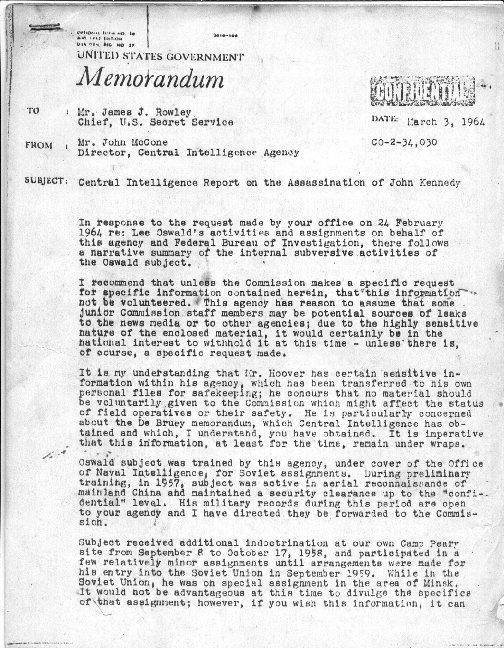
MORE CONFIRMATION;
Some people have requested to see this.
Gochenaur tells how he learned that LHO was an informant for the FBI and SS
Agent Moore coerced Dr.
Perry into changing his story about the throat wound.
===================================================
Agency: HSCA
Record Number: 180-10109-10310
Agency File Number: 014182
Originator: HSCA
From:
Gilbert, Howard M.
Title:
Phone Interview; Gochenaur
Date:
06/01/77
Pages:
28
Subjects:
Gatton [sic - Gayton], Carver
Hosty, James
Moore, Elmer
Oswald, Lee Harvey
FBI; Association with Oswald, Lee Harvey
Conspiracy Theory
Box: 252
Select Committee of Assassination
U.S. House of Representatives
3342 House Office Building, Annex 2
Washington, D.C. 20515
June 1, 19
77
MEMORANDUM TO: Robert K. Tanenbaum
FROM:
Howard M. Gilbert
SUBJECT: Telephone interview of Gochenaur
DATE:
June 1, 1977
According to critic R. E. Sprague, he had been informed
by James
Gochenaur that Gochenaur had had conversations with former FBI agent Carver
Gayton. According to Sprague, Gayton told Gochenaur that James Hosty had
stated that Lee Harvey Oswald was a paid informant who had been giving
information regarding the potential assassination of Kennedy. During the
telephone conversation with Gochenaur, he con-firmed the fact that he had had
conversations with Carver Gayton at the University of Washington, and that
Gayton had told Gochenaur that he, Gayton, and Hosty had worked together at the
Kansas City office after Hosty had been transferred from Dallas. Gochenaur
related that Hosty had said that Oswald had been paid by the FBI to inform, but
that Oswald had not come up with any information. According to Gochenaur,
there had been no discussion of an assassination, but that Hosty had gone to
find
Oswald when he didn't make his re-port. Gochenaur also allegedly had
conversations with Secret Service agent Elmer Moore regarding the Secret
Service's feelings about Kennedy, and that Moore allegedly said that he had
induced one of the treating physicians in Dallas to change his statement.
A tape
recording of the Gochenaur telephone conversation was made with the consent of
Gochenaur and a transcript is now being prepared. The address where
Gochenaur may be reached is contained in the transcript. Gochenaur gave an
affidavit to Senator Church with Gochenaur promised to send me, but hasn't.
HMG:mw
Telephone interview of: James Gochenaur
Interviewed by: Howard M.
Gilbert
Date:
May 10, 1977
Time:
3:20 p.m. EST
G: (Above information) . . . I am on the telephone with Mr. James
Gochenaur, G-
o-c-h-e-n-a-u-r, is that correct, Mr. Gochenaur?
JG: That's right.
G: All right, and I have indicated to Mr. Gochenaur that I would like to
tape this
telephone conversation, in lieu of taking written notes, with his permission.
Is that
right?
JG: That's right.
G: And do you give your permission that this telephone conversation may be
recorded. Is that correct?
JG: Right, could you do me a favor?
G: Sure.
JG: Could you send me a transcript of it?
G: Certainly.
JG: Ah, thank you.
G: Your address, let me make sure I have your address correct. Is it
3515 E.
Tesch St.?
JG: Ha, no, I'm moving, but the problem is, I've forgotten the number, I
want you
to mail it to my parents . . . .
G: Oh, you'd like it mailed to your parents address, and what is that?
JG: 2930 . . .
G: 2930
[end of p age one of transcript]
2.
JG: South Harmon.
G. South Harmon.
JG: Milwaukee, and that's 53207.
G: Mil-waukee, [sic] what is the number?
JG: 53207.
G: 53207, Milwaukee, WI. OK? And why don't you give me their
phone number,
too, just to . . . .
JG: 481-
G: 481-
JG: 2052
G: 2052
JG: Area code is 414.
(414-481-2052)
G: Now Jim, let me just make sure that this is recording, so lets, stop
for a
second and let me just check that.
JG: OK.
G: Now, what I'd like you to do is go back and go through this
chronologically, as
to the first contact that you ever had with a man by the name of Carver Gayton.
And would you spell his last name for me please?
JG: G-a- G-a-t-
G: -t-e-n?
JG: -t-o-n, yeah, something like that. Carver.
G: It's either -ton or -ten.
JG: Right, -ton, I believe.
G: -ton, and his first name is Carver, C-a-r-v-e-r?
JG: Right.
G: And where was Mr. Gayton when you first met him?
[end of page two of transcript]
3.
JG: Ah, the situation was that my wife and I were looking for another
apartment in
Seattle.
G: Seattle, Washington?
JG: Right. We were on 135 Harvard Ave. at that time, and my wife
responded to
an an [sic] ad in the paper, and ah, called the guy, and gave him the
particulars on
what we were looking for, what we were willing to pay, and everything, and he
said that he made a point of meeting the people before he, ah, you know, would
rent.
G: OK.
JG: Ah, he did come over and this was in December or 19- ah, I believe
1971.
G: December 1971 - were you a student at that time? Or working in
Washington?
JG: 1970, make it 1970, I blew it. Ah, yeah, I was a student at that
time, at the
University of Washington in Seattle.
G: December of 1970. All right.
JG: Right.
G: And Gayton come [sic] over - or you went over to Gayton's?
JG: No, he came over to our place, he said he was in the area -- he didn't
live too
far from where we were.
G: OK.
JG: And he came over, and talked for a while, and he mentioned that he'd
happened to have been an ex-FBI agent.
G: Did he initiate that usbject? [sic]
JG: Yes.
G: Now prior to your conversation with Gayton, had you had any connection
at all
with the Kennedy assassination investigation?
JG: Not directly. What had happened prior to that is that I had been
talking with
two people, one was a fellow who was involved with the Seattle Secret Service,
and I had met him in a sort of oblique way, and ah, what had happened was that I
was trying to get some photographs that had been taken in Dealy [sic] Plaza at
that time and I was going to make some photo silk-screen decals of them for an
art project.
G: OK.
JG: And when I tried to locate how I could get ahold of the
[end of the page three of the transcript]
4.
photographs, the UPI said that I'd have to call the Secret Service. And
when I
called the Secret Service, I got, ah, this guy, ah, on the line, this Elmer
Moore, and
started talking with me, and ah . . . .
G: OK. Well, let's take Mr. Moore at the -- after we finish with Mr.
Gayton.
JG: Yeah, right, well, I'm saying what he . . . .
G: Right, I just wanted to know what information you had, so we know that
you
had something.
JG: Ah, very, very skinty.
G: OK. Now Gayton mentioned in, ah, now did you bring that, elicit
that, that he
had been a former FBI agent, or did he volunteer it?
JG: No, he - ah, I , he a - he asked me what I was doing and what my goals
and
plans were, and after I told him, I said, by the way, what do you do? He
said, well,
I used to be an FBI agent, since he's a black guy, you know, I said -- Oh, yeah?
'Cause I didn't really believe there were black FBI agents. OK?
G: All right.
JG: And, ah, he says, of sure I was, and we started talking and we talked
about,
you know, all the whole situation at that time, Spiro Agnew was into his thing,
you
know, and we were going on about various different subjects, and it finally came
around to the fact that he was very disturbed by the King assassination thing.
G: All right.
JG: Very, very disturbed. He said, by the way, by a curious
coincidence, he said,
I happened to have been in, ah, assigned to the Kansas City field office . . . .
G: Now, is that Kansas City, MO.? [sic]
JG: Right.
G: OK.
JG: He was assigned to that office right after he got out of the FBI
academy,
apparently.
G: Now do you recall what year that would have been? Did he indicate
to you
what year he was assigned to that field office?
JG: He did say it a year, but I can't remember it.
G: All right.
[end of page four of transcript]
5.
G: Go ahead.
JG: Anyway, he didn't, he did say that he was talking with a guy by the
name of
Hosty, that had been . . .
G: H-o-s-t-y?
JG: Right. Jim Hosty, who had been intimately involved with the
Oswalds.
G: All right.
JG: And he said . . . .
G: He vol-, ex-, let me interrupt just for a second. Ah, Gayton was
volunteering
this information to you?
JG: Right, well, I was asking him some questions as it was rolling along.
We, it
was a very long conversation, you know?
G: OK.
JG: And I offered him some, ah, refreshment there, you know, and
everything, we
were sitting there talking about it.
G: Do you recall the address where you were when he had this conversation with
you?
JG: Yeah, 135 E. Harvard Ave. [sic] in Seattle.
G: OK, and was your wife present also?
JG: Yes.
G: Was there anyone else present?
JG: (no audible reply)
G: I understand now, let me just see if my notes are correct, I was told
by Dick
Sprague that perhaps other [sic] researcher had also been present at the time of
your conversation with Gayton.
JG: No, no, no.
G: OK.
JG: No, ah, just my wife and myself and ah, her sister was there for a
little bit.
G: What was her sisters [sic] name?
JG: Tina Tingle.
G: And do you know, how old was she at that time?
[end of page five of transcri
6.
JG: Seventeen, no, she would have been, take that back, she would have
been
sixteen.
G: All right, and do you have a present address for her?
JG: No, I don't, I could get it . . . .
G: Is she -- are you still married to the same woman?
JG: No.
G: All right. What is Tina Tingle's name at this time, do you know?
JG: I'm assuming, ok, that it's the same.
G: All right, but you could locate her for us?
JG: Sure.
G: All right, would you go back in the conversation to the point that Gayton
started
talking about the Oswald's [sic] and Hosty.
JG: Right, OK. He brought up the -- he says, by the way, he says, I
said to him, I
said, you know there's some speculation, uh, words to this effect, and, I mean,
there's some speculation that Oswald was connected with the government, at
some point. He says -- oh, he was. I said, oh, you know that for a
fact? He say,
[sic] oh, yeah. Hosty told me that he was, ah, what he was a security, ah,
potential security informant.
G: Now, did he say that Hosty used the term potential security informant?
JG: I -- yeah, that was his [sic] first thing that he said.
G: OK.
JG: And he said that, ah, the problem with Oswald was that he wasn't doing
any
informing.
G: You mean he wasn't turning in sufficient information?
JG: He wasn't doing anything, apparently.
G: All right.
JG: He said that Hosty was irritated, he was getting pressure to find out
why
Oswald wasn't giving information.
G: OK.
[end of page six of transcript]
7.
JG: And, ah, that he was running around trying to pressure Oswald into
talking
with him about it at some length,
but . . . .
G: Did he, that'd be Gayton, indicate what type of information that Oswald
was
supposed to be giving to the FBI?
JG: No.
G: Did he indicate at that time whether or not Oswald was to be paid for
the
information? Or was he receiving money at that time from the FBI?
JG: I'm trying to get it straight. I think that -- that he told me
that Oswald was
being paid. He was being given a certain amount of money, but that Oswald
wasn't, 1) [sic] I can't remember distinctly, Oswald wasn't showing up at his
drops,
he wasn't leaving the kind of information at these drops that he was supposed
to,
and that he just simply wasn't communicating with the Bureau.
G: All right. Was there anything in this conversation relating to
whether or not
Oswald was reporting information about potential assassination of the President.
JG: No.
G: OK. What else was said about Oswald and Hosty?
JG: Well, apparently ah, the reason that Hosty had talked with Gayton was
the
fact that Gayton had bailed him out of a ticklish situation in Kansas City,
(cough) . . .
G: They were both agent -- FBI agents there together, weren't they?
JG: Right.
G: OK.
JG: Apparently Hosty had blown some sort of a cover for some sort of
surveillance and ah, I guess Hosty was being in a punishment situation, in
Kansas
City, to begin with, and I guess more black marks against him had been a
problem. And apparently Gayton had covered up some indiscretion at the
stakeout of some sort. I really don't remember the details on [sic] it.
Excuse me.
(Apparently someone called to him) Yes. (Voices)
G: Do you know the year that this conversation between Hosty and Gayton
was
supposed to have taken place?
JG: No, no, I don't
G: OK.
[end of page seven of transcript]
8.
JG: But, ah (cough) Gayton was ecstatic about the fact ah, something was
wrong
with Oswald, and that ah, he was an informer at some level, some sort.
But, he
wasn't talking, he wasn't giving information, he wasn't cooperating, and ah,
apparently ah, Hosty's mission, or one of the things that he had to do, was to
try to
pressure Oswald into giving the information of talking information, but he
wouldn't
do it.
G: Well, did Gayton indicate to you ah, the nature of the information or
what
Hosty was trying to do to encourage Oswald to reveal the information?
JG: Not a bit, no. In fact, ah, I think, if I remember right, I
asked the question,
well, do you know what he might have been informing about, and he said, well,
Hosty didn't tell me, and, ah, I left it at that. OK?
G: OK.
JG: He intrigued me about that of course, I felt that it was kind of
interesting that
he would be talking to me about it. Ah, it seemed to me that as the
conversation
was going along, he was getting more and more vented up that Hosty had been
wronged, somehow, by the Bureau, in the whole episode.
G: Well, did Ho-, did he reveal to you anything that Hosty had told him
about the
assassination?
JG: No, no, he didn't. Not at that time.
G: Did he -- you had later conversations with him, did you?
JG: Yeah.
G: Did he reveal during that first conversation for what reason Hosty had
been
moved to the Kansas City Office?
JG: Yes, he did say that ah, Hosty had opened his mouth somewhere along
the
line and Hoover or, I guess they have some sort of an inspection bureau or
something, within the FBI, said, you known, that he did a transgression there in
handling the whole situation around the assassination situation, so they sent
him
to Kansas City as part of a punitive situation.
G: During that first conversation, though, they didn't become more
definite as to
what Hosty had done wrong.
JG: No, no.
G: OK. Was there anything else that went on during that first
conversation?
[end of page eight of transcript]
9.
JG: Nothing other than the fact that he closed up the conversation by saying
that
he was perfectly willing to rent the apartment, or actually it was a flat, to
me, on
23rd St. and that he'd like to talk about it further. He had an
interesting
conversation [sic]
G: All right. When's the next -- but you didn't become a tenant at
that particular
point?
JG: No, it was about three weeks later that we moved in.
G: Was that -- would that have been after the first of the year?
JG: Right.
G: OK.
JG: But, see, I've got a -- I've got in my possession a -- a lease between
Gayton
and myself.
G: All right.
JG: And, ah, I don't remember the exact dates but I remember it was right
around
the first of the year, because I -- why I had to hold off was I got a student
loan and
it hadn't come in yet.
G: All right. Can you furnish us with a copy of that lease?
JG: Sure.
G: OK. Now, when was the next contact that you had with Gayton?
JG: Next contact was probably about 3 or 4 weeks later, when he whetted my
appetite enough to start [sic] him some point blank questions, you know, about
the fact that while, OK, here you're saying that, OK, that Oswald indeed was
some
sort of an informer and being paid for it.
G: Now, where did this conversation take place?
JG: At the University, I talked with Gayton on a phone on a number of
occasions, I
didn't document a lot of them, OK?
G: Was he an administrator or, a teacher?
JG: Yeah, he was an administrator at the University of Washington.
[end of page nine of transcript]
10.
G: This is located in Seattle?
JG: Right, he was in the old main section.
G: Right, you're [sic] second conversation that you had with Gayton about
this,
was there anyone else present?
JG: No.
G: Had you become a tenant by this time?
JG: Yes.
G: At the time that you actually formally became a tenant, did you have
any
further conversation with Gayton, about the Kennedy [sic], or Hosty, or the
assassination, or Oswald?
JG: No.
G: So, the next time, then, was about when you saw him at the University?
JG: Right.
G: Would this have been sometime after the first of the year 1971?
JG: I think it was toward the latter part of January.
G: All right, and what did this conversation entail?
JG: Well, basically I went up there to tell him, you know, that I was in,
and that I
really liked the place and everything, and we started talking again, and I guess
at
that point, he showed me a picture of (cough) Bobby Kennedy, OK?
G: Mm-hmm.
JG: With Kennedy's signature on it. OK?
G: Right.
JG: And he gave me a description of how people were being prepared to go
into
shake hands with Hoover, and he was among the first group of black agents, ok?
I think he graduated in '64 or something like that, out of the academy.
G: All right.
JG: And he would give me a description of that and then I think I broke in
with ah,
hey -- you know, you were telling me that, you know, that Oswald was in fact
some level of informer for the FBI and I think at that point I did ask him what
he
was supposed to have been informing about, and (cough) Gayton said -- I don't
know.
[end of page ten of transcript]
11.
G: This was in your conversation at the University.
JG: Right. He said -- I, I, don't really know, all I really know is
that ah, he said all I
really know is that Jim Hosty had been trying to pressure or find the guy, and
pin
him down to why he wasn't, you know, cooperating.
G: All right, what else went on in that conversation. Did you get
any more details
at all?
JG: Well, he did say one thing that I thought was fairly interesting.
Apparently
Oswald had some sort of an apartment in (cough) in ah, some suburb of Dallas.
G: In Irving.
JG: Yeah. Ok, and apparently Hosty just went over there one evening,
and tried
to locate him. OK? And he banged on the door a couple of times and
nobody
answered, or anything like that, so what he did was that he took a note out, --
now, Hosty told Gayton this, and Gayton was relating this back to me. OK?
G: Ok.
JG: And he said that he wrote a telephone number and Hosty's name on this
paper and put the paper under the door.
G: Who did this, Hosty?
JG: Hosty, right.
G: And he slipped that under, ah, Oswald's wife's door?
JG: No, ah, ah, the apartment I believe.
G: The one in Irving?
JG: Yeah.
G: OK.
JG: And, ah, I guess Oswals [sic] never responded to it.
G: All right.
JG: And I guess at that point, ah, Hosty got pretty angry and was going to
. . . .
G: Is this what Gayton told you that Hosty had related to him?
JG: Yeah.
G: All right.
[end of page eleven of transcript]
12.
JG: And then, as the conversation went along, ah, he started to get away
from
any real substantive kind of detail on anything, he just kept on saying that,
well,
you know, the whole episode was just a big embarrassment for everyone.
G: OK.
JG: And, he said that, ah, ah, that it . . . .
G: Di [sic] he . . . . go ahead.
JG: OK. he [sic] kept on, in fact that word was used quite a bit, -
[sic] the whole
episode was quite embarrassing.
G: Now, did he at any time, ah, tell you that Hosty had discussed with
him, a
particular note or threat, that Oswald was supposed to have left with the FBI
for
Hosty.
JG: No.
G: OK. Now, did you have anything else -- did you discuss anything
else about
the assassination or about Oswald, at [sic] that particular conversation?
JG: No, in fact, ah, he had to go, there was a person came [sic] into the
room that
said that, ah, he had to go to a meeting of some sort. And I remember it
was, all
in all, about 20 minutes or so, that I talked with him.
G: When is [sic] the next time that you discussed with him anything about
Hosty,
of Oswald, or the assassination?
JG: Well, I think it was probably about 2 or 3 weeks later. I really
didn't, as a
matter of fact, I didn't really get into a situation, like, like, Sprague likes
to think of
me as a researcher, OK? Not really. I was interested, but I also had
a hell of a lot
of other concerns, I was sort of just simply, you know, ah, catch as catch can,
if I
saw Gayton, I decided to talk with him. You know.
G: All right.
JG: And . . . .
G: Well, did you get into any further conversations with Gayton regarding
Hosty,
and what Hosty had said?
JG: No, ah, not . . . . , [sic] now, let me see . . . . I talked with
Gayton a lot, ok?
G: Mmm-hm.
[end of page twelve of transcript]
13.
JG: And about a lot of other things, other than just the assassination
situation,
and I think that when it was brought up about Hosty, ah, Gayton sort of tailed
away
from it, somewhat, so to speak, OK? after [sic] that, but he did emphasize the
point that Hosty was mistreated by the whole episode, he did emphasize the point
that Hosty was very, very, very, ah, sure and clear of the fact was some sort of
security informant.
G: Did he ever say to you that Hosty had started or represented that
Oswald had
been giving information about a proposed assassination?
JG: No, no, I never heard any words like that, at all. Ah, one day,
toward the end
of the time that we were at Gayton's place, which was about a year, ah, I
went
over to his office and I wrote him a letter, ah, and in it I expressly said that
I think
that the information that you have about this other thing, should be given to
some
Congressman.
G: What did you have reference to?
JG: As to other things?
G: Yes. Were you referring to the fact that Oswald was supposed to
be an
informant for the FBI?
JG: Yes, I listed, ah, somewhere along the line I've got a copy of that
letter, ok?
G: Mmm-hm.
JG: Uh, in it I listed a number of points that he had raised with me over
the year
that I knew him, and . . . .
G: Would you send us a copy of that letter that you sent to Gayton?
Together
with the lease?
JG: That one might be rough to find, but I think I can duplicate enough of
it, that
you know, he might still have it, ok?
G: You mean, now, this letter that you sent to Gayton?
JG: I hand delivered it to him.
G: Hand delivered a letter to Gayton.
JG: Right, in his office, and I, and I, intimated to him that my wife's
relatives,
(clears throat) I have my wife's relative is a friend of Senator Proxmire, and
that by
some means, you know that, what he should really do is, is tell what he knows,
you know, to an official person, you know, of some sort, and in it I, I went
over the
fact that he had told me things that had to do with ah, Hosty, OK?
[end of page thirteen of transcript]
14.
G: The things that you have referred to me?
JG: Right.
G: Have been discussing with me?
JG: Right. Ah, things that had to do with certain situations at
Seattle, and what
he supposedly knew about the King assassination.
G: OK. Did you have any further conversations after that with Gayton?
-regarding
[sic] anything dealing with Oswald? Hosty? or [sic] the assassination?
JG: The only thing that I'm fairly clear about is the point in which we
were -- ah --
one time I was down in the 23rd St. area, and I was hitch-hiking, and he picked
me up, and we were talking along the way, and he seemed to have -- ah -- he
intimated that, ah, you know, that -- ah, the Bureau thought of Kennedy as kind
of
a play-boy nincompoop, a kind of person who was, ah, in fact, ah, incompetent,
ok? And that he probably deserved what he got. And he said that was
what
some of the people in the Bureau thought.
G: Did he ever say that he thought that Hosty had made that statement?
JG: No, he didn't, but I the impression that thats [sic] what -- where it
was coming
from, because in the next breath, he says, you know, poor old Hosty, he caught a
lot.
G: Did he explain that at all?
JG: No, He just, he, he ended up the conversation with the idea, you know,
he
says, it was all a big embarrassment.
G: Was that the last time that you dealt with Gayton?
JG: Yeah, that's right.
G: When was the last time that you saw him?
JG: (sigh) Ooooh, [sic] I think it was just before we left, we left
Seattle in March
of '72, and I think I caught a glimpse of him at the University and said
"hi" to him,
and he went by.
G: All right. Now, when you gave your notes to Sen. Schweiker and
the other
gentlemen who were in the room . . .
JG: Yeah.
G: . . . . did you discuss with him, ah, with them the things that you and
I have
discussed now?
[end of page fourteen of transcript]
15.
JG: No, they concentrated on Moore.
G: Oh, they were speaking more about the Secret Service agent Moore,
rather
than Hosty?
JG: Right.
G: Did your notes that you delivered to them -- and you're going to send
us a copy
of those notes?
JG: Yes.
G: All right. Did they concern agent [sic] Hosty, the FBI agent?
JG: Ah, very briefly, I think toward the middle of the conversation I had
with
Schweiker, very briefly they mentioned (cough) the Counsel, and I can't remember
his name -- mentioned that, well, he's also talked to a man by the name of
Gayton
and he had told him that, ah, you know, that Hosty had this, and that, ok?
G: Now, the Counsel for the Schweiker Committee . . .
JG: Right.
G: . . . indicated to you that they, the Committee, had spoken with Gayton,
about
Hosty?
JG: No, no, they didn't say that, no -- let me go back and tell you about
that day,
ok? that [sic] I was in Washington.
G: All right.
JG: This was on the fourth and fifth of January in '76.
G: Go ahead.
JG: Ok [sic]. On the day that I arrived there, ok, they had me most
of the
afternoon in conference, under oath, and all that. They -- the very next
day, they
had Moore, ok, coming in, and what they were going to do is that if Moore had
denied that he had ever met me, they were going to spring me on him.
G: I see.
JG: And they had me waiting in a room adjacent to Moore, when they were
interviewing him.
G: This was after you had already testified.
JG: Right. Ok, now, when I was sitting in there, two other men came
in the room,
and I remember their names, ok?
G: All right.
[end of page fifteen of transcript]
16.
JG: It [sic] was a short fellow, ah . . . .
G: Where was this room, here in Washington, D.C.?
JG: Right. It was right across the street from the Rayburn Bldg., it
was a Hotel
[sic], old one.
G: Ok. Do you remember the name of it?
JG: Yeah, it would be on the -- ok, there's the Rayburn Bldg., and it
faces, the
face that goes west, ok?
G: All right? [sic]
JG: It's [sic] right across the street, directly across the street, an old
hotel.
G: All right. Let me ask you this. Do you, what year was this
-- what year or
month, if you recall?
JG: That I was interviewed?
G: Yes.
JG: January, [sic] 1976.
G: All right. Go ahead then, with the occurrences.
JG: Ok, I was sitting in the room, there, waiting for them to spring me on
Moore,
so to speak, and a little guy came in, small fellow, with glasses, ok?
G: Mm-hmmm.
JG: With an eastern accent. He introduced himself as a man that was
concerning himself with the King assassination. And that he had heard in
conversations that I had talked with a guy by the name of Carver Gayton.
And I
said -- yes -- and I, he said, well, could you furnish us a little more
information
about this guy, and I very briefly said that I knew him, I very briefly went
into the
fact, you know, that I have a document that shows that I know him because I had
a, you know, a lease from the guy, signed by the guy, and that ah, you know,
he'd
given me certain information and certain intimacies about, you know, how he felt
about the way the bureau [sic] handled things. The FBI.
G: All right.
JG: And the guy said he'd be very interested in talking with me over the
phone
about it, ok? And I said -- sure, fine -- and then he left the room.
And the guy
never got to me. Let's put it that way.
[end of page sixteen of transcript]
17.
G: Ok.
JG: And, ah, I don't know, he said he would like to -- I remember him
saying that
he would like, he said ah, have you talked with Gayton in the last two years?
You
know. And I said -- no.
G: All right.
JG: In fact, I haven't had any conversation . . . .
G: You don't know what the name of this individual was then?
JG: No, all I can do is give you a physical description.
G: Did he give you, show you credentials showing who he was with?
JG: No. He came in with that guy that, ah, he came in with a guy
that was the
Counsel for Schweiker.
G: All right. OK. What is a brief physical description of the
man?
JG: He is a short man, I would say that he is probably Jewish, I would say
that he
was, ah, slightly balding . . .
G: What age?
JG: I would say, early forties. Late thirties. Ah, very
intelligent guy, had good
command, ah, good communications skills.
G: Any facial hair, do you remember?
JG: No.
G: All right.
JG: He had glasses, dark rim.
G: Did you get the impression as to whether or not he was an attorney?
JG: Yes, he was an attorney.
G: All right.
JG: He identified himself as an attorney, and a counsel, and handling a
certain
aspect of the King thing.
G: All right. Was he with the Schweiker Committee?
JG: (sigh) I believe he was, yes.
G: All right.
[end of page seventeen of transcript]
18.
G: Well, now, you've mentioned also the Secret Service agent Moore.
Did that
have any connection to the Kennedy assassination?
JG: Yes.
G: What information do you have with respect to that?
JG: Let me ask you this. Ah, do you have access to Schweiker Committee
files?
G: Well, limited amounts.
JG: Ok. Well, I, I heh, you know, . . . . [sic]
G: I can't answer that totally because that's not my area. So . . .
.
JG: What I'm saying is that everything that I, that I would tell you is
detailed, --
[sic] they, they, took copies of everything that I writ-, [sic] that I had, ah,
given
them. Ok?
G: Mm-hmmm.
JG: They put them in a large, thick folio. OK?
G: Mn-hmmm. [sic]
JG: And they had three thick folios when I was there, they had one that
had, ah, I
saw the name Elmer Moore and that was the thickest one, ok?
G: Yes.
JG: Then there was a very thin [sic] with me, then there was another name
I
couldn't see that was about as thick as Moore's.
G: All right. Do you -- can you send copies to us of the information
that you gave
them on Moore?
JG: Yeah, I, I, I, [sic] my own impression is that Moore is ten times more
important than Gayton, because it's . . . .
G: Can you give me a very brief indication of why, what areas that Moore
had
anything to do with.
JG: OK. Moore was a Secret Service agent, assigned to the Dallas
area on
November 22, '63. He's the only agent that wasn't there. He said he
was in San
Francisco. He was in charge of the interrogation of the Doctors, [sic] he
was in
charge of the Secret Service interrogation of Ruby, and he was liaison between
the staff of the Warren Commission and the Secret Service. I think he
directly
reported to a man by the name of Kelly [sic], in the Secret Service. And
Moore
gave me, he said two things that I think are important to me and caused a little
bit
of stir when I
[end of page eighteen of transcript]
19.
mentioned them when I was at the thing with Schweiker. When I was, I went
to
Moore's office one time, to talk to him, ok? and While [sic] I was there
he got
pret- (end of tape)
G: Hello?
JG: Yeah.
G: Just let it go for a second here 'til we make sure we're recording.
JG: OK.
G: Let me just test it again to make sure. OK? Hold on a
second.
G: OK, we're recording properly now, go ahead. You were telling me
about
Moore now.
JG: Yeah, well, Moore said something -- he said ah, he said ah, to me in
effect,
he said -- well, he said ah, I still think the little son-of-a-bitch, referring
to Oswald,
did some shooting that day. And I said -- hey, wait a minute, you're
telling me
that, you know, he did the shooting. He said, well, he said, all I know is
this. He
said, we know he met with a subversive the day before the assassination.
G: Did he say what subversive?
JG: No, but when I mentioned that Schweiker, when I was talking with
Schweiker, Schweiker interrupted me and he said -- are you sure he didn't say
three days before? And I said -- no. Moore said that he thought that
he saw, that
he met with this guy a day before the assassination.
G: All right.
JG: And, ah, as far as I know, I've heard any reference to Oswald meeting
a
subversive anywhere. And I . . . .
G: What was your connection with Moore?
JG: Ah, he's a guy that I had called, ok? when [sic] I wanted to get some
pictures
for an art project, and the guy held me on the line for a long time, he kept
saying --
well, hey, you know, he says, I was intimately in-, [sic] he took the
assumption,
ok, that I was some sort of a critic.
G: All right. Now, he was still with the Secret Service when you
called?
JG: He still is.
G: Ok, still is.
[end of page nineteen of transcript]
20.
JG: But, ah, you know, he . . . .
G: His first name is what?
JG: Elmer.
G: Elmer Moore. Ok.
JG: And, ah, he -- when I first talked to him, ah, he, he, was you know,
just
completely and totally ah, into the thing that I was trying to write him about
the
whole Kennedy thing, and all I really wanted to do is get information where I
can
get ahold of a photo. And ah, I call him now, he said, call me, you know,
if you
have any questions, and so I did a couple of times, and he says, hey, why don't
you come on over to my office one day, we'll sit down and talk about it. I
said --
fine. Heh. So I went over there, and I talked with him for about
five hours,
and . . . .
G: Where is his office located?
JG: In Seattle, Washington. The Court House.
G: Ok.
JG: One the second floor.
G: Now, he had been attached to the Secret Service -- to the Dallas
office? Of
the Secret Service?
JG: Right.
G: Ok. Now, what did your conversation with him pertain to?
JG: Ah, basically, him venting his anger at Kennedy, and ah, . . . . [sic]
G: What was his anger based on? Did he say?
JG: Well, he said he was a traitor.
G: He said Kennedy was a traitor?
JG: Yeah.
G: This is what Elmer Moore said?
JG: Right.
G: Now, why he say [sic] -- how did he explain that? What did he
mean?
[end of page twenty of transcript]
21.
JG: Well, he prefaced it by saying that ah, well, he said, you know, no
matter how
strange things get here, we've got it better than they do. But he was
giving every
thing away to the. That's what he was saying.
G: He was saying Kennedy was giving things away?
JG: Yeah, to the Russians. Ok?
G: All right.
JG: And, ah, then he went on to say that ah, well, ah, one of the things
that was
pretty impressive to me was the fact that when I was talking with him, he said
that
ah, we had to do what we were told, in regards to, you know, the way the way
they were investigating the assassination, or we get our heads cut off.
G: Did he say who told, [sic] who gave them the orders?
JG: No.
G: Did he explain what he meant he meant [sic] by getting his head
cut-off?
JG: No, but he certainly was shaking at that time, he was ah, he went
from-, [sic]
ok, let me explain that when I talked to him it was on May -- trying to think --
it was
May, May 7 . . . .
G: What year?
JG: 1970, I believe. May 7, 1970, in the evening, I had come over
there roughly
around 4:30 or so, and I stayed until about eight o'clock with him. And
ah, as, as
the evening wore along, the guy got more and more -- fact is, he was scaring me.
He was giving, you know, his speech mannerisms were getting pretty violent.
Ok?
G: Well, did you think it was odd that he was being this candid with you,
a
complete stranger?
JG: Completely. Ah, I -- to tell you the truth, if I were to all put
it down into words,
I'm very amazed by the whole series of events.
[end of page twenty-one of transcript]
22.
G: Well, he, this was at the Secret Service Office that you met him,
right?
JG: Right.
G: Ok. Was there any one else present?
JG: No.
G: All right. What did he have to say about Kennedy? Or
anything that indicates
to you that he may have knowledge -- ah, or may have done something wrong
in
the investigation.
JG: Ok, what he told me was this, he said that he had badgered Doctor
Perry into
changing his testimony, he did not feel good about that.
G: He -- being Moore?
JG: Yes, Moore talked to Perry and, I guess, really laid it on to the poor
guy.
G: In what respect, what areas did he badger Perry with respect t [sic]
JG: Ah, what Perry had seen, as he was doing his emergency operation,
apparently.
G: Well, in what way's did he indicate to you that he had Perry distort
the truth?
JG: In -- I think that what he was trying to say was him [sic] to making a flat
statement that there was no entry wound in the neck, or that where the position
of
the wound in the back [sic], what Moore was telling me after he talked about
that
was the fact that his study, and the study that went into talking with the
Doctors
[sic], is that there was no conclusive evidence where any of the shots had come
from, at that point. Ok? If the report that he had written up . . .
.
G: Now, this was on the day of the assassination, you mean?
JG: I don't know when it was, I don't, I don't know the date that it was.
He
showed me a couple of papers . . . .
G: Well, did he, did he indicate to you in any way, or can you recollect
as best
you can, the exact words or substance that he used with respect to what he did
to
Perry?
JG: Apparently, well, he said that he had come back from San Francisco the
day
after the assassination. He went to Washington first. From
Washington, he got
some marching orders to go down and talk with the doctors at Parkland Hospital.
And ah . . . .
[end of page twenty-two of transcript]
23.
G: So, he didn't get to -- there 'til the 23rd, then.
JG: Something like that, I, I, I [sic] really wish I could remember
clearly what he
had said on that, but I do know that he went to Washington, first, and then went
to
-- he immediately went to talk with the doctors, and he talked to Perry, and
apparently he told me that there was one thing that he did during the whole
thing
that he didn't have a very good feeling about, was, the way he put it, badgering
Perry. And ah . . . .
G: Did he explain to you what he meant by this Oswald meeting with the
subversive, the day before the assassination?
JG: No, other than when -- well, he gave the idea . . . .
G: 'Cause he was in San Francisco the day -- he, being the agent, Moores
(sic)
[sic] . . . .
JG: Right. So he says.
G: So, how would he know what Oswald did the day before the assassination?
JG: Good question. When ok, when everything started to get heated
was when I
asked him -- were you really in San Francisco that day, you know, then the guy
really blew up.
G: What did he say?
JG: He started shouting, he said, he came out with that phrase I told you
about --
we were -- I did everything -- how'd he put is [sic] -- he says, ah -- I did
everything I
was told, we all did everything we were told, or we'd get our heads cut off.
You
better believe that, is the way he put it. Then he went in, launched into
the thing
about -- right, immediately after that launched into the thing that ah, you
know,
Kennedy was ah, you know, dealing the wrong way with the Russians, he felt that,
ah, you know, he had a traitor (teen) [sic] to him. (cough)
G: Was there anything else in your conversation with Moore that related to
the
assassination, or anything that Moore did?
JG: Well, when he drove me home, he drove -- or offered to drive me home,
which was -- hnn [sic] -- at that point I was not in such good shape. I
said, -- [sic]
ok, drive me home. And ah, as we were driving along, he said, you know, he
says, ah, I don't know, he says, maybe Oswald didn't act alone. He says, I
guess
we'll never know, because he's dead. But he says, where was the money, we
were trying to find the money, and we couldn't find where the money came from.
G: Now, what money is he speaking of.
JG: Good question, I d--, I didn't follow up on it. Ah, I was,
[end of page twenty-three of transcript]
24.
JG: (cont.) you know, twenty-one, twenty-two, no, how old was I? I was
about
twenty-three years old, I wasn't too -- heh -- I don't know how to put it, I, I,
[sic] my
mind wasn't working as quick as it should have been, I should have followed up
everything that I had talked about, and I -- I've gone over this with my head a
number of times, but I do remember he saying something to the effect that --
well,
we couldn't find the money so we had to leave it alone, or something to that
effect.
OK?
G: Did he say where he looked for the money?
JG: No. No, he said -- we couldn't find how, how, ah, he said -- we
couldn't trace
the money . . .
G: But did he tell you what money he was referring to?
JG: No, but it sure came up in the conversation.
G: What was that?
JG: Well, I don't know. There wa -, [sic] there was something about
a Marina
Oswald trust fund. I don't know what, how that came up, but I remember him
saying, he says, well we know there was a Marina Oswald trust fund. And,
ah,
then he said something to the effect about, ah, well, we couldn't trace the
money.
Now, Oswald and me have acted with others, and maybe there was a good
possibility he did, but he's dead now, was the way he put it.
G: I see. He didn't have any other substantive information?
JG: No.
G: Do you know what the results of the Schweiker Committee talking to him
was?
JG: No, they wouldn't, in fact they were, ah, the guy that I talked to,
afterwards, I
said, well, what's you think of Moore? And he said, damn, I wish you had a
tape
recorder when you were talking to the guy.
G: Hm. [sic]
JG: And he said, ah, something to the effect as I was leaving, he said,
ah, I wish
you had had your shit together out there, you know?
G: Ok, uh, have you been contacted by anybody else, ah, any official
agency,
since your testimony in front of the Schweiker Committee?
JG: No.
[end of page twenty-four of transcript]
25.
G: Ok, Jim, is there anything else ah, ah, that you, that you want to add
at this
point in time?
JG: I don't know, I- It probably sounds quite senile and
staccato the way that I've
been talking to you, but what I'm getting at is, very simply, is that my minds
really
not together at all of the things that have happened, and if I had those notes
in
front of me I think I could give you a clearer picture . . . .
G: All right.
JG: . . . . (double voice) with Moore, ah (cough Gayton, I think, is
just simply a
guy venting, you know, a lot of frustration.
Would you take down my name and address, and get a copy of that lease and the
notes, and any other materials you have, and send it off to me, just as soon as
you can?
JG: Yeah.
G: All right. You got [sic] a pencil and paper?
JG: Mmm-hmmm.
G: My last name is Gilbert, G-i-l-b-e-r-t.
JG: Mhhh-hmmm.
G: My first name is Howard.
JG: Mhh-hmmm.
G: You send it to the Committee, Select Committee of Assassinations, House
Annex Bldg . . . .
JG: Hold on, House Annex?
G: Yeah. A-n-n-e-x.
JG: OK.
G: Bldg. #2. Washington, D.C.
JG: Zip?
G: 20515.
JG: OK.
G: All right. What do you do right now, Jim?
[end of page twenty-five of transcript]
26.
JG: I'm an employment counselor with a national employment agency.
G: All right. Do you have a college degree?
JG: Yes.
G: In what field, and from what University?
JG: Ah, I've got a BF- [sic] ah, MFA in Art, and that's ceramics major,
from the
University of Washington, Seattle.
G: OK.
JG: (cough, cough)
G: Very good, ah, Jim, I appreciate talking to you, ah, soon as we get a
transcript
on -- we're a little short on stenography ah, help, here . . . .
JG: Ha-ha.
G: . . . . so, it will be a little while before we get it to you.
Its' now, ah, 4:02 in the
afternoon, on May 10, and would you please try and get those notes to us, ah,
and
the lease, copy of the lease, just as soon as possible?
JG: Ok. When are you going to -- ah -- are you going to be talking
with Gayton
pretty soon?
G: Pretty soon, and so I'd appreciate it if you could, ah, do you think
you can get
those to us in the next day or so?
JG: Yeah, I'll get that out to you tonight.
G: Ok, I appreciate that, very much.
JG: With a hand written note that I think would be more helpful.
G: Yes, I'm sure they will help a lot. OK, very good, now, nice
talking to you.
JG: Thank you.
G: All right, Bye-bye.
JG: Bye. (end of conversation)
[end of page twenty-six of transcript and end of document]
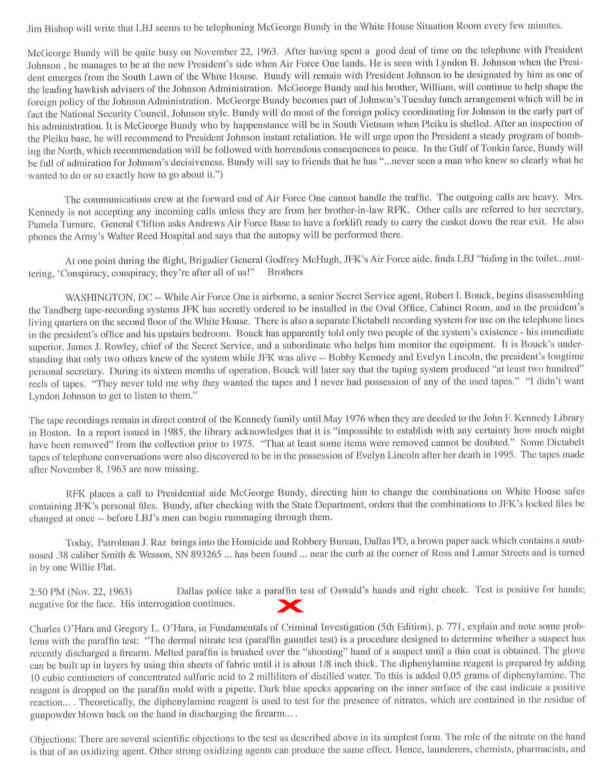
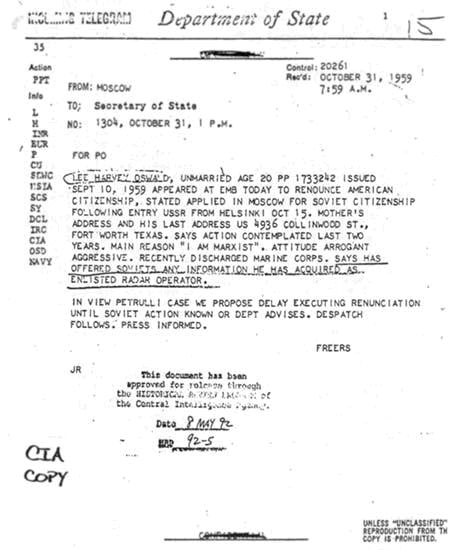
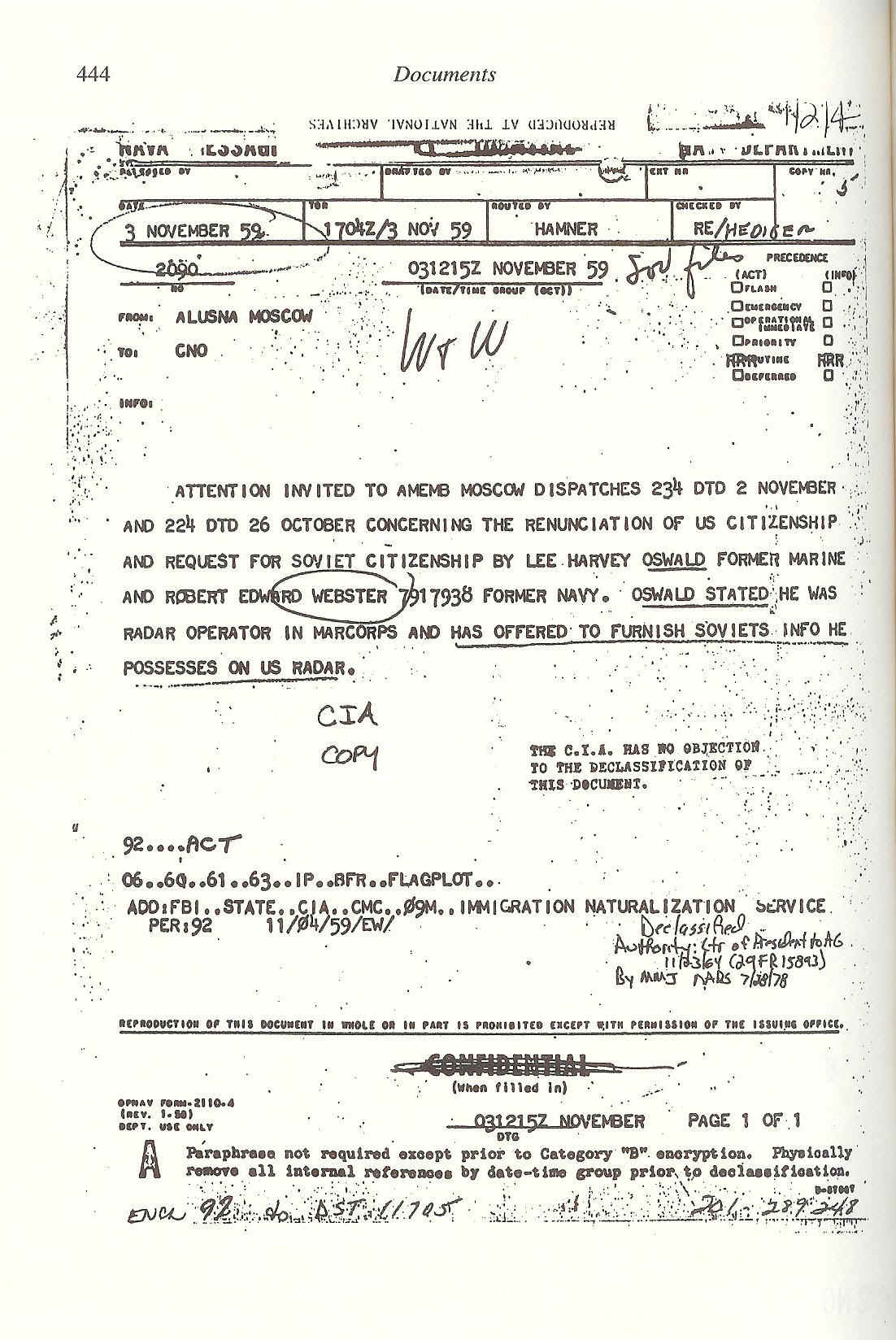
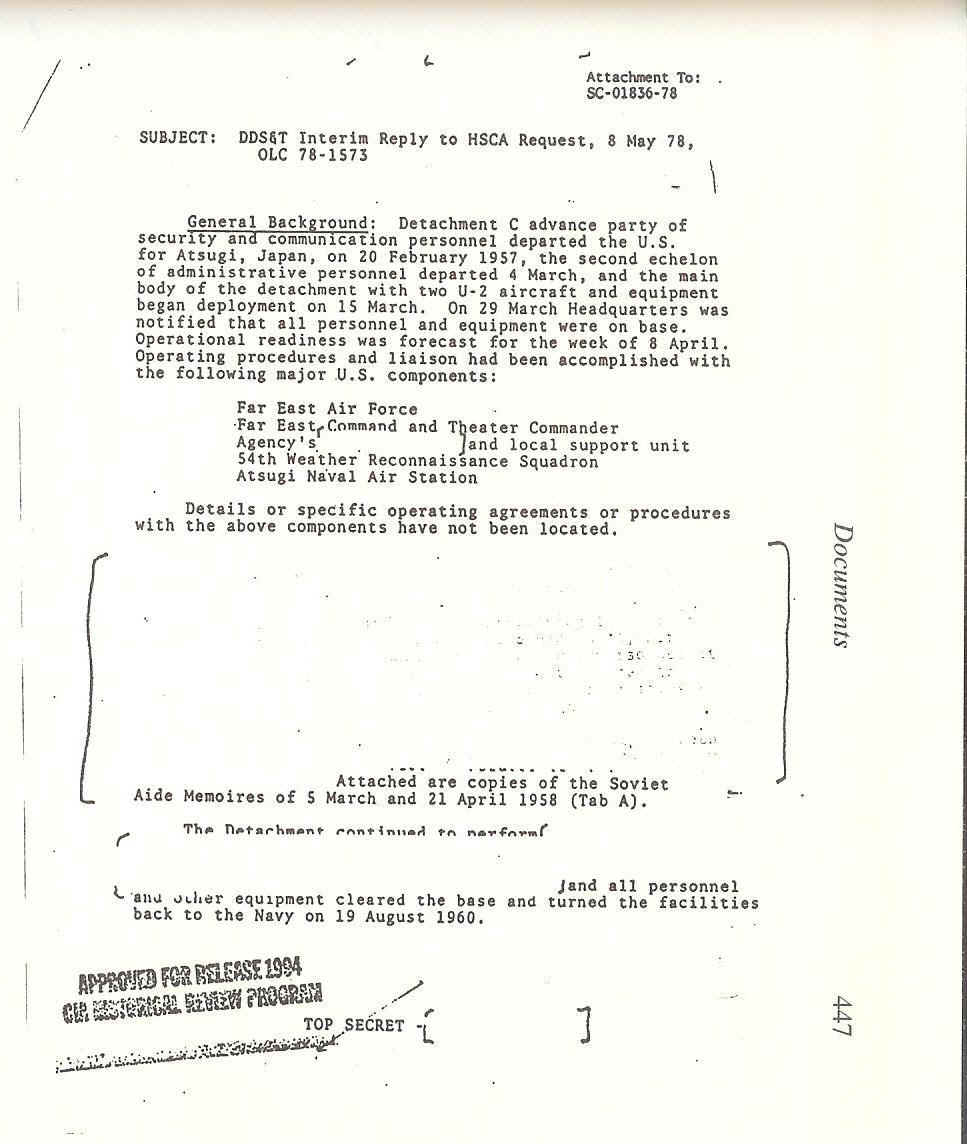
The Government/Media tells us that Oswald was a Loner.
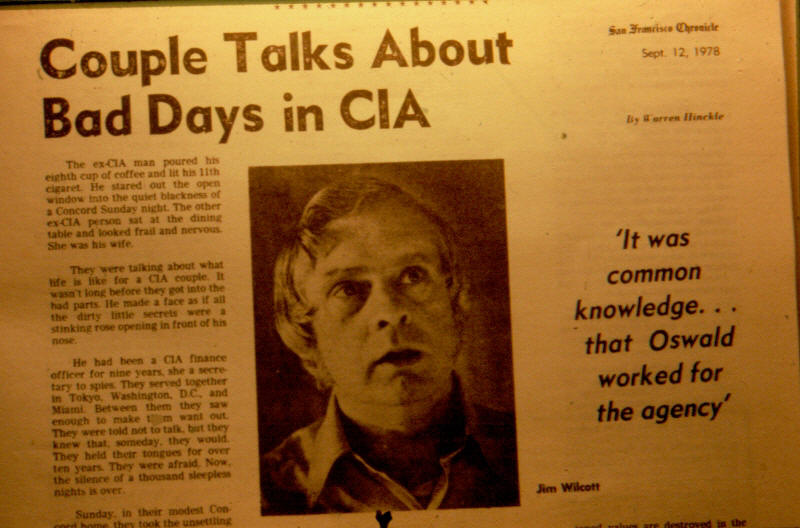
WHY was the above report never Investigated?
What the heck is a "Defector" doing evaluating U-2 photos in 1962?
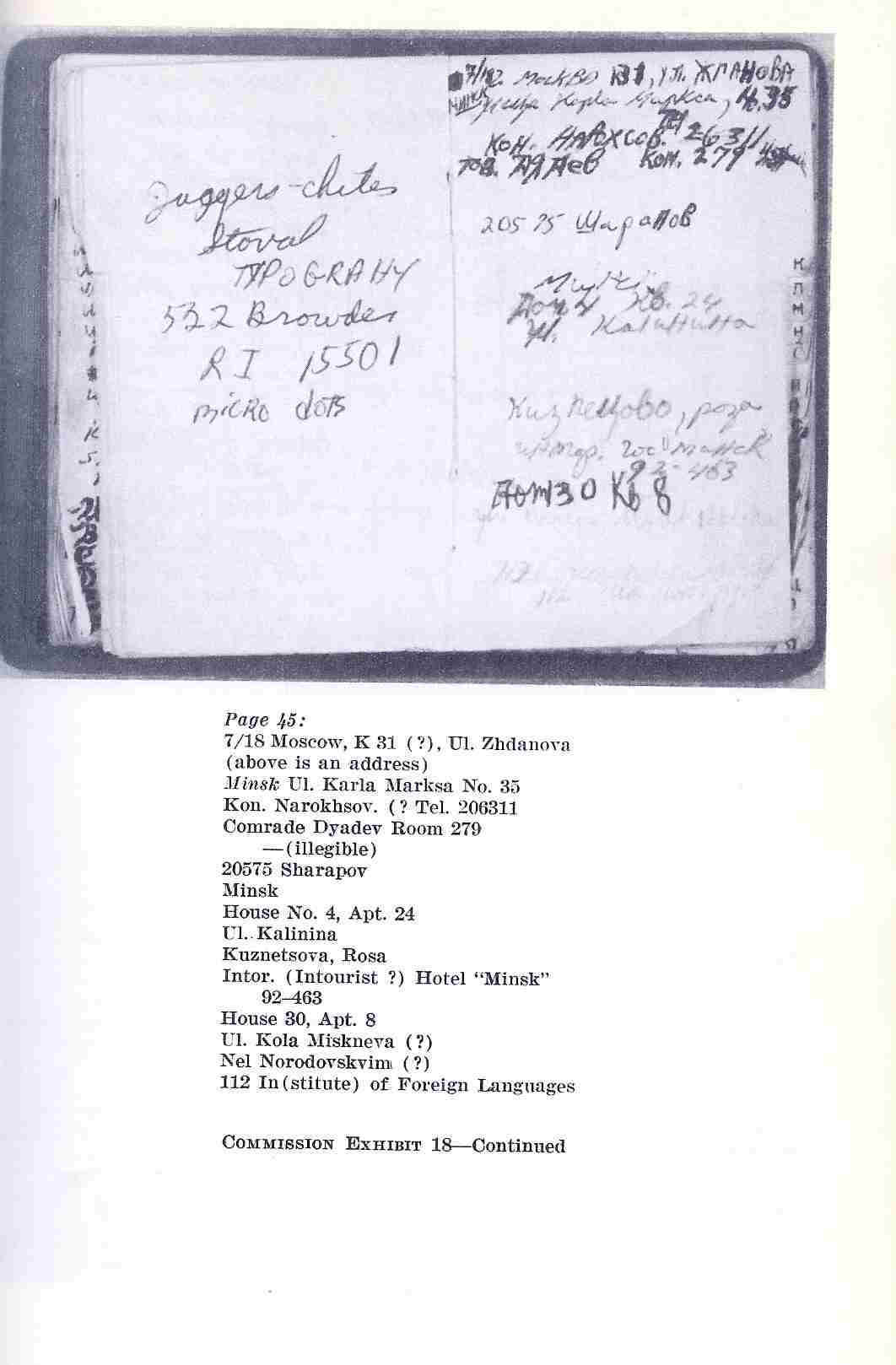
L-O-N-E-R-?-?-?
Do the following photos depict a L-O-N-E-R-?-?
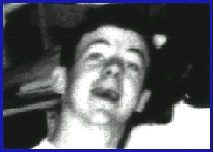
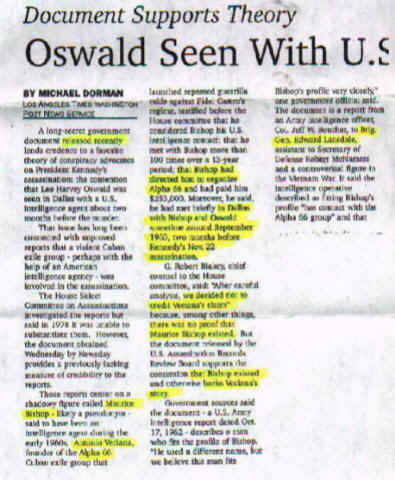
Below are excerpts from Warren Commission Executive Sessions.
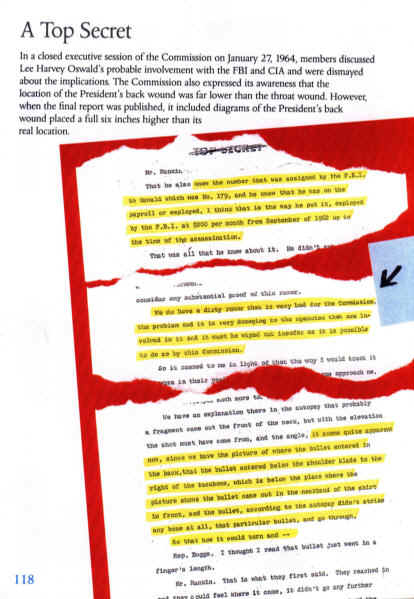
Executive session discussion about Oswald being an Informant for the FBI.
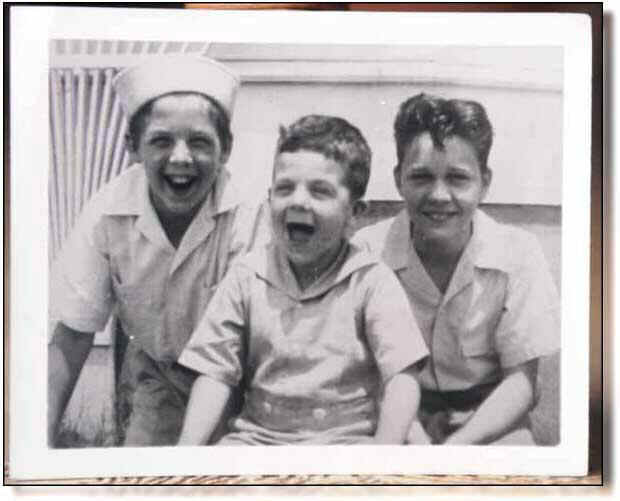
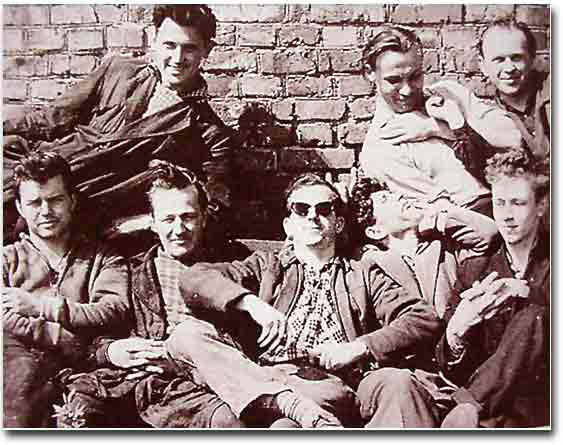
So much for the Claim of "Loner" I guess.
The Government/Media tells us that Oswald was a less than Brilliant.
Would our Gov't allow dummies to track "Top secret" U-2 planes on radar on 3 Top secret bases around the world?
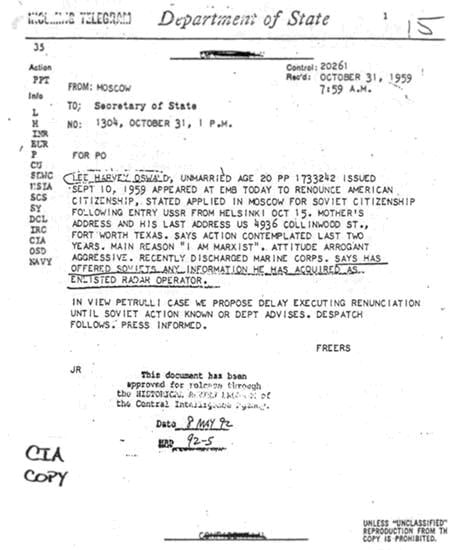
Would our Gov't grant a new passport to a "Known Defector" within 24 hours of application?
Especially when there is a "NO" next to Oswald's name on the list of applicants.
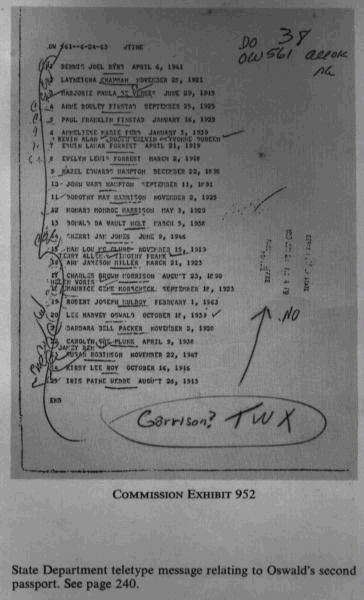
If the Gov't story of Oswald being a screw-up while in the Marines, HOW could Oswald contract a Venereal Disease "IN THE LINE OF DUTY"?
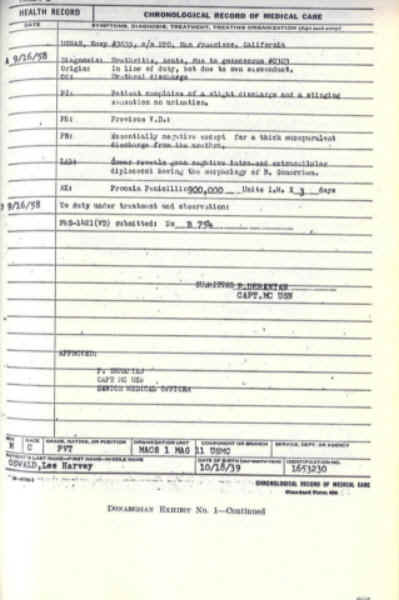
The Government/Media tells us that Oswald taught himself Russian.
Oswald studied Russian at the Military School of Languages in Monterey California while still in the U S Marie Corps. (See Below.)
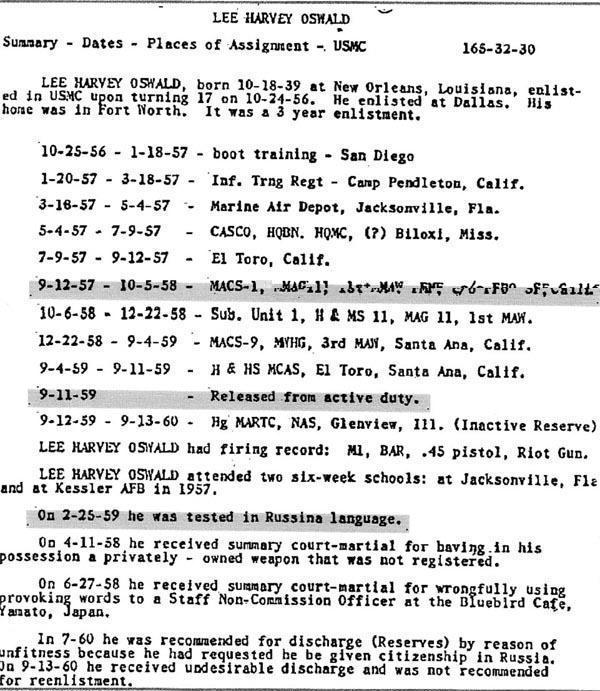
When you read Oswald's notebook in the 26 Volumes you see that Oswald had a working knowledge of FIVE (5) languages.
English
Russian
Spanish
German
Japanese
HOW did Oswald get from England TO Helsinki Finland?

What made Oswald think he was entitled to a Military flight back to the U S A?
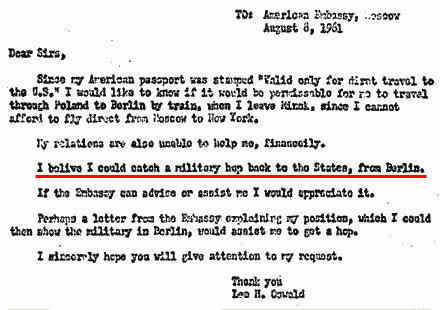
Upon his return from Russia, Oswald was employed at Jaggers-Chiles-Stoval on U-2 Photos of Cuba During the Cuban Missle Crises. (Below)
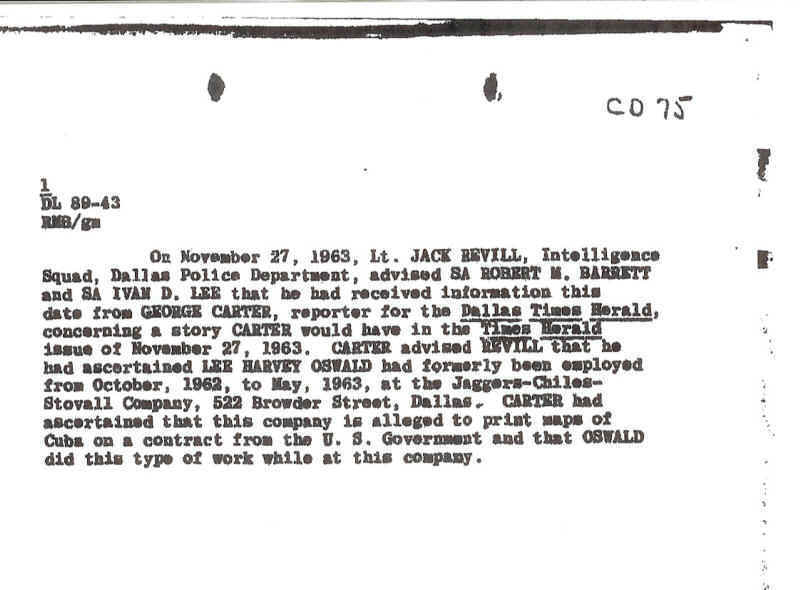
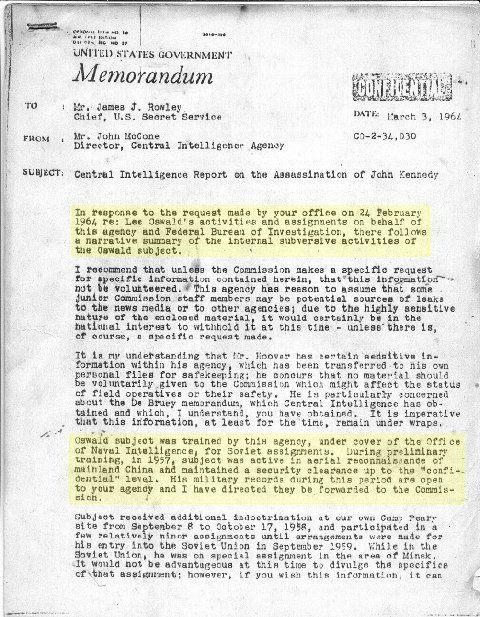
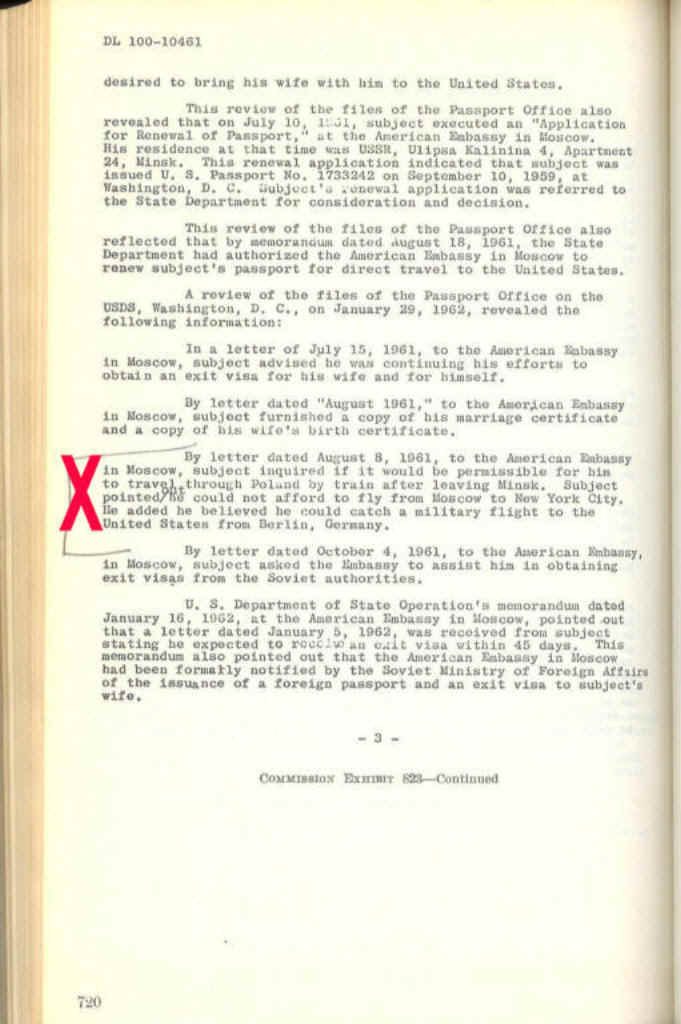
I have on video tape that during the 50's & 60's the CIA supplied their people with "Minox Cameras".
A Minox Camera is a very expensive very tiny Spy Camera.
A Minox camera was found among Oswald's possessions by Dallas police.
The FBI unsuccessfully attempted to "Pressure" the Dallas Police into Changing the Minox Camera to a Minox Light Meter. (see Detective at HSCA Below
as of april 27, 2014 it looks like the cia is admitting that oswald was one of theirs
the cia has a wall of stars for each one of their agents who has died in the service of their country
without names the names are in a special book.
see the story here>> http://www.duffelblog.com/2013/11/lee-harvey-oswald-quietly-added-cia-memorial-wall/#!F3wdp
Gus
Rose’s HSCA Deposition
Moriarty: How many photographs and negatives did you find?
Rose: We found quite, several photographs.
Moriarty: I mean of him.
Rose: Oh, of this particular, I don't recall but the one photograph and
the negative. I don't recall seeing more than that but there may have been two.
We looked through a lot of property and of course, we confiscated it, brought it
in along with a whole lot of other property. All of the property we recovered
from the residence, I initialed it, Stovall and I initialed it and dated it for
evidence. Among the property we found a little Minnox miniture camera and on
checking it, it did have a little roll of film in it. Anyway, all of this
property was later released to the F.B.I. All of it was released after Oswald
was killed.
Moriarty: Does that about cover it?
Rose: That's just about it.
(Break)
Moriarty: I think we last talked about a Minnox camera and some film in it
being among the property.
Rose: We found this camera and of course, we brought it and a whole lot of
other property in, as possible evidence in the case. And uh, while we were
marking the evidence for later identification by us to be used in evidence we
did, Stowall and I, did take a close look at this Minnox minature camera and it
did have a roll of film in it. As time passed and after the Warren Commission
was appointed, uh, a couple of F.B.I. agents made three different trips to our
office to talk to me about this camera. They said that after they had received
all the property they found that I had made a mistake, and that that really
wasn't a camera, it was a Minnox light meter. However, as I told them at the
time, I was sure that I had not made a mistake, it definitely was a camera and
definitely did have film in it. However, they wanted me to change that in our
property invoice to read Minnox light meter and not read Minnox camera. We never
did change it. Uh, Captain Fritz instructed me if I was sure I was right not to
make any changes in any reports, to stay with what was right.
NON-MINOX
TESTIMONY DELETED
Moriarty: This Minnox camera. Was that with Ruth Paine's camera equipment?
Rose: No, it was in the sea bag.
Moriarty: Oh, in the sea bag.
Rose: Ruth Paine explained to me, she stood, she stood right there while
we searched. And she explained that everything in that sea bag and a couple of
boxes that were there was Oswald's and she never had any objection to any search
of that. The only time she objected was when we searched her bedroom where a lot
of her camera equipment was. She did not object when we searched Marina Oswald's
bedroom, the one she used.
Moriarty: Did Ruth Paine happen to see you take the Minnox camera out of
the sea bag? Did she make any comment about that?
Rose: No, she never commented on it and I doubt that she remembers the
specific items because there was a great number of items that we took out of
there. We never made any mention of it at the time. The only thing we did make
specific mention of was the photograph of Oswald where he was wearing a pistol
and holding a rifle and newspaper.
Moriarty: My bottom line question is if there was a consent search form,
I'd like to see a copy of it or.
Rose: Yeah, we did not have this form.
Moriarty: O.k. I didn't think so but I wanted to check with you. Let's
see. You're quite sure that this Minnox camera was a camera. Did you open it up
and see film in it, or. . (pause) This is a little, I'm not up on cameras
myself. This is a little camera isn't it, the Minnox?
Rose: Very small. It's not any bigger than a half pack of cigarettes.
Moriarty: Ok. I think I've seen pictures of it.
Rose: And you kind of push it together to make it snap. It's not any
bigger than a pack of cigarettes. And in this particular one, it did have a roll
of film in it. And there's no question absolutely that it was a Minnox minature
camera.
Moriarty: And you initialed it.
Rose: Yes I did.
Moriarty: Do you remember where or how?
Rose: Somewhere on the base of the camera I scratched my initials. So did
Stowall.
Moriarty: Very good. I assume that was all part of the property that was
turned over to the F.B.I.
Rose: Yes, it was. Now they later did come back and request that I change
that on the invoice to read Minnox light meter, but it definitely wasn't a light
meter, it was a camera.
Moriarty: Was that described as a Minor camera with film? As you recall?
Rose: I don't recall.
Moriarty: I may have a list here someplace in my briefcase. Hold on just a
minute while I dig it out. I'll shut this off temporarily to save some tape.
(Break.)
Moriarty: No, this is another list. So, if you'll just continue on this
camera. Uh, either you described it with or without film on the list that we
still need.
Rose: Right. It will be listed as a Minnox minature camera, but I don't
recall whether it mentioned whether or not it had film in it.
Moriarty: But you did initial it.
Rose: Stowall and I both. I put GFR and he put his initials, RS Stowall.
Then all the property was initialed, including the paper property, letters,
pictures, and all the property, we did initital it. It took several hours to
initial all of it.
Moriarty: Ok. Very good. Now, uh, do you recall the particular agents'
names that visited you requesting that you change the description of this
particular item?
Rose: No, I don't. There were a lot of new agents in town at that time and
these were some that I did not know, and I don't recall their names.
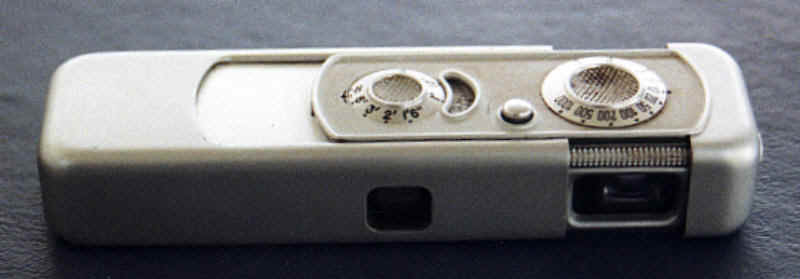

Below is DPD Inventory of Oswald's belongings taken into custody. From Volume XXIV page 340.

Here is a Terrific web site on the Minox Camera.
http://jfkresearch.freehomepage.com
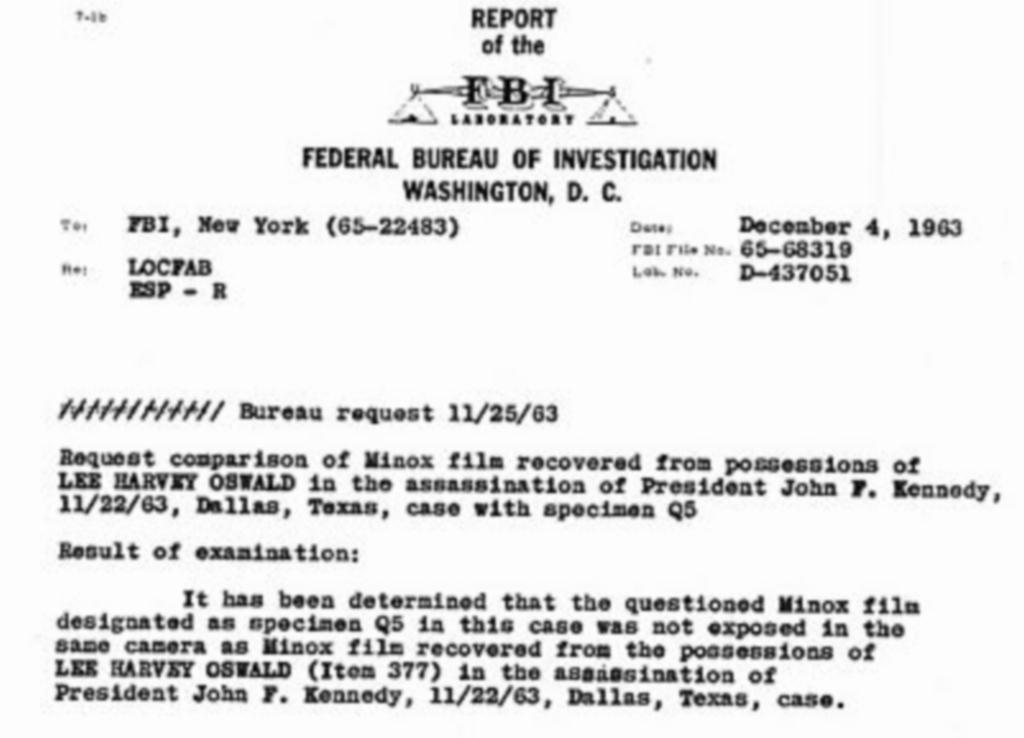
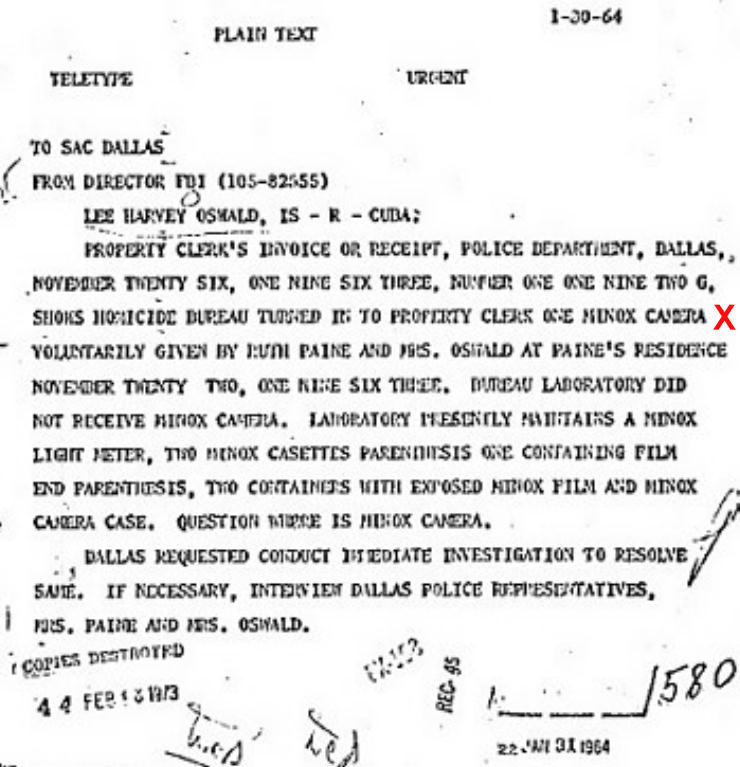
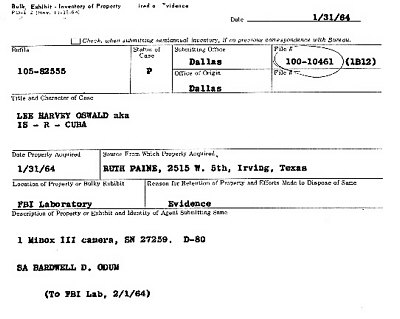
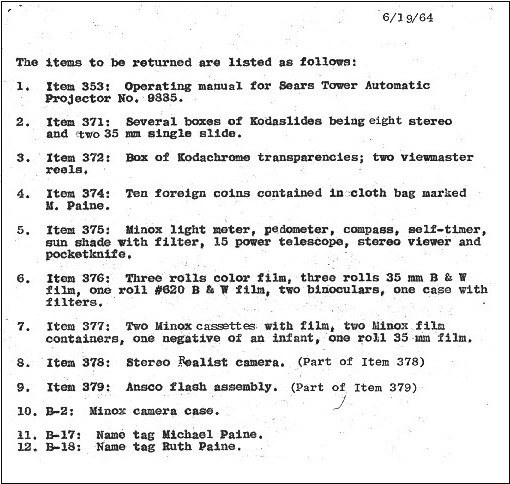
And best of all, the Minox negative is 8 X 11mm, small enough to hide beneath a postage stamp. The photograph below shows a Minox negative (the one used to make the above print) besides a standard size postage stamp.
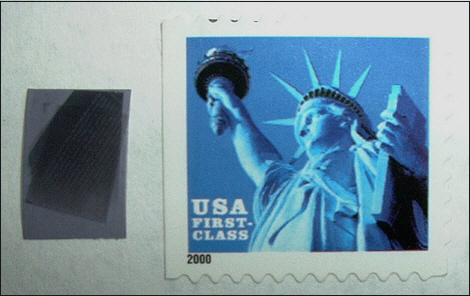
Click Here to return to the article about the Minox
DID OSWALD COMMIT TREASONOUS ACTS?
See Exhibits Below.
These actions were all undertaken when the CIA had a "Fake Defector Program" in effect.
These actions were undertaken when the CIA had "Fake U-2 Manuals" printed up.
These actions were undertaken when U-2 pilot Francis Gary Powers was under orders to Destroy the U-2 plane and Commit Suicide.


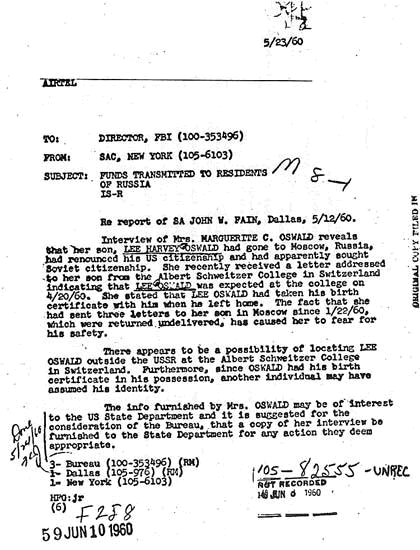
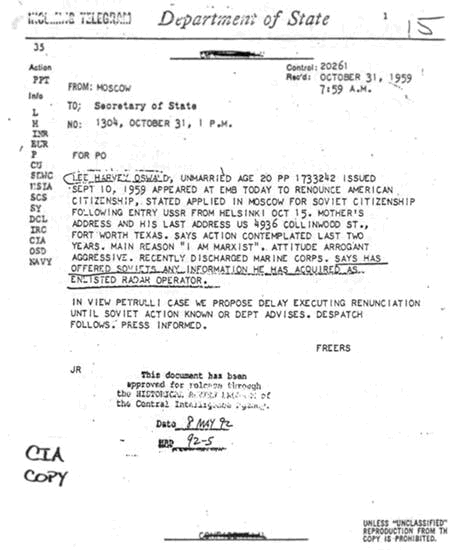
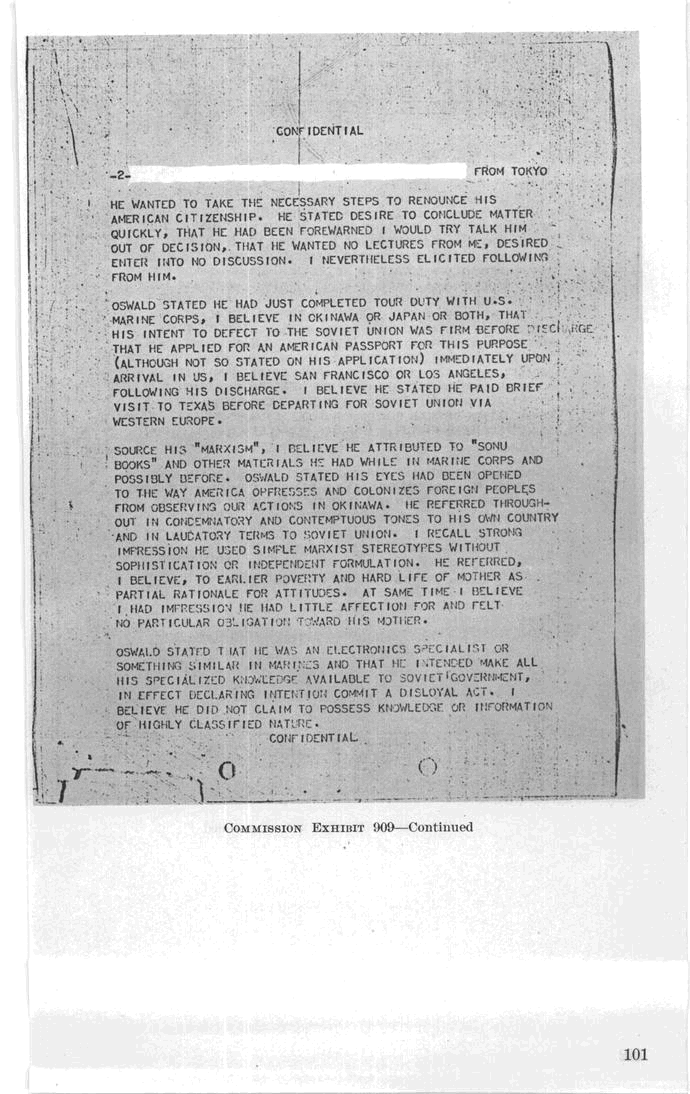
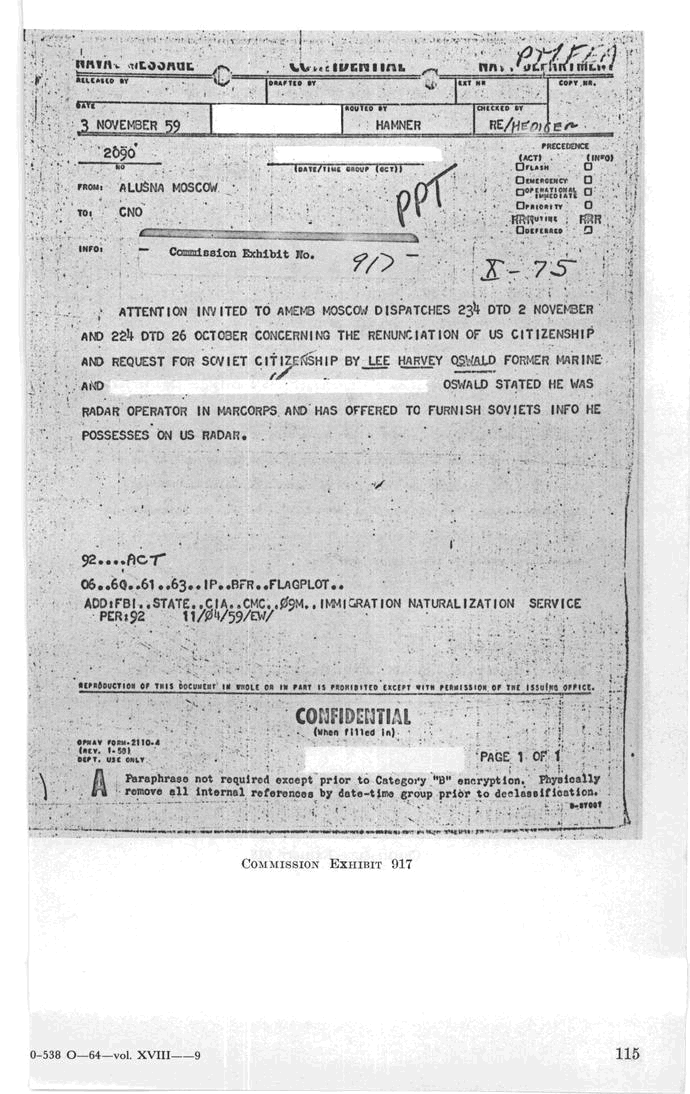
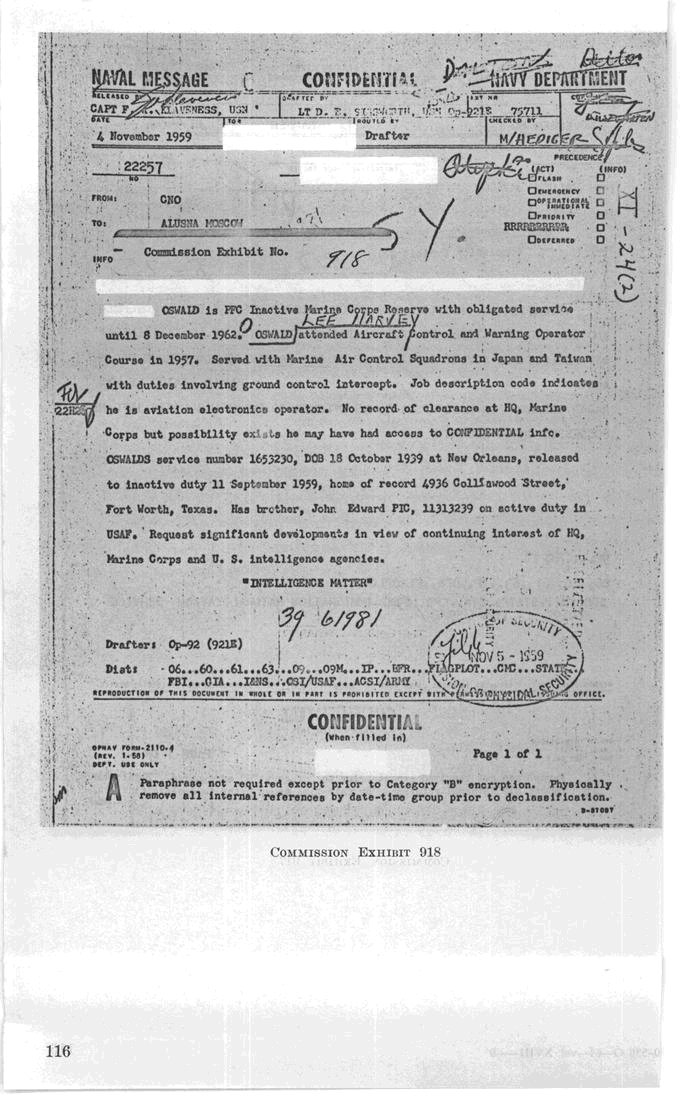
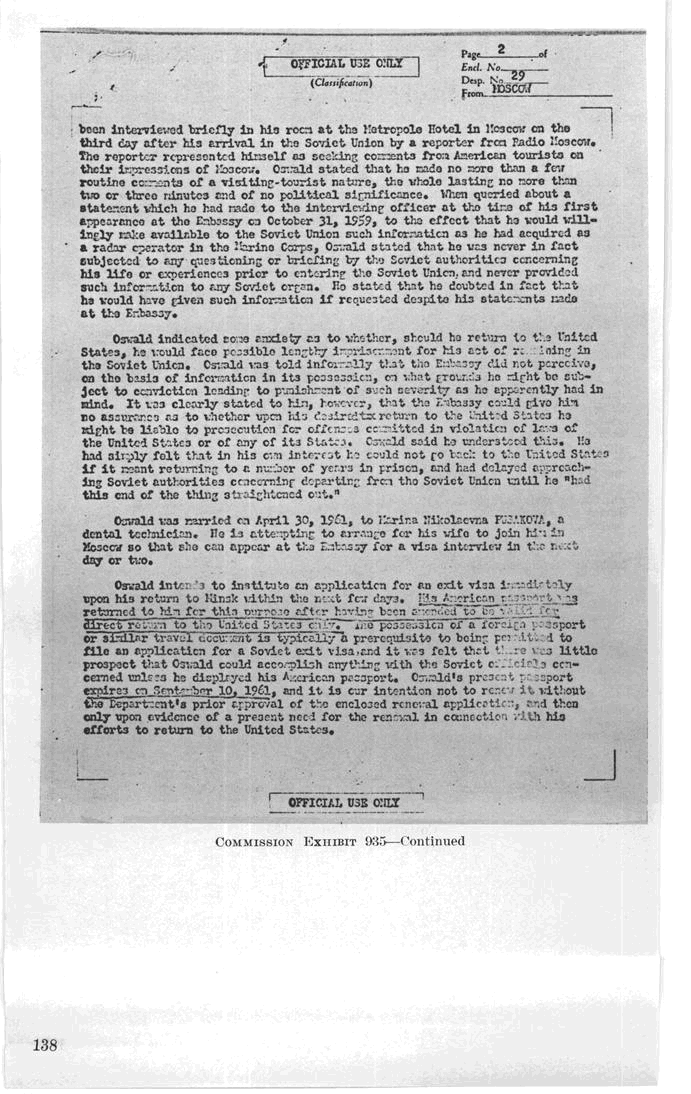
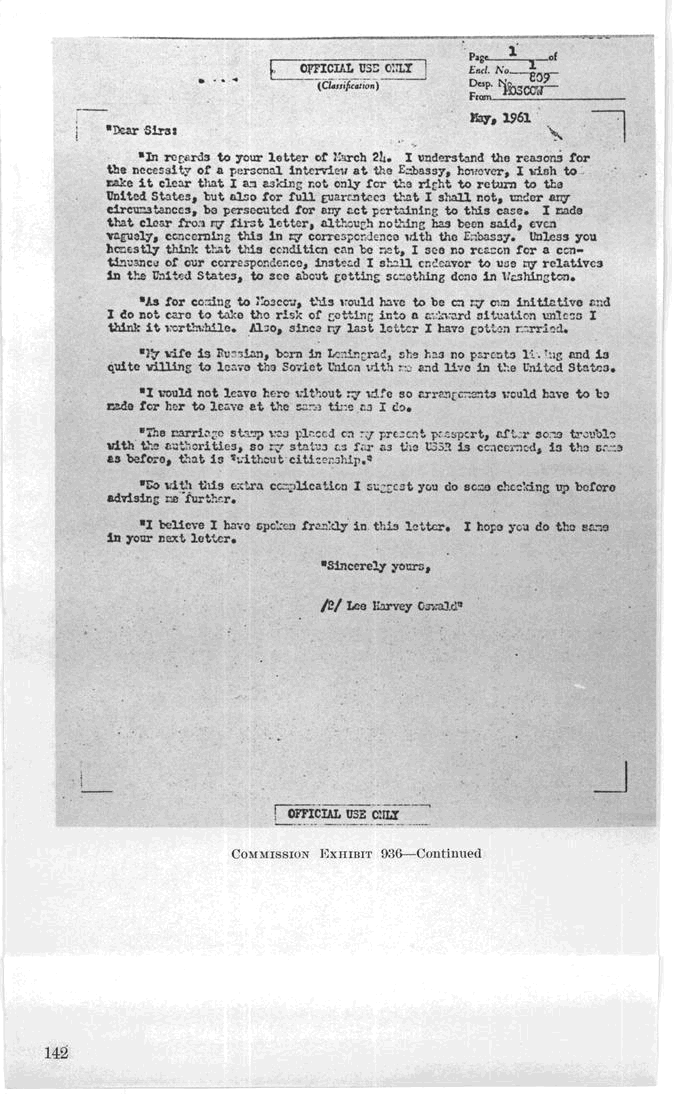
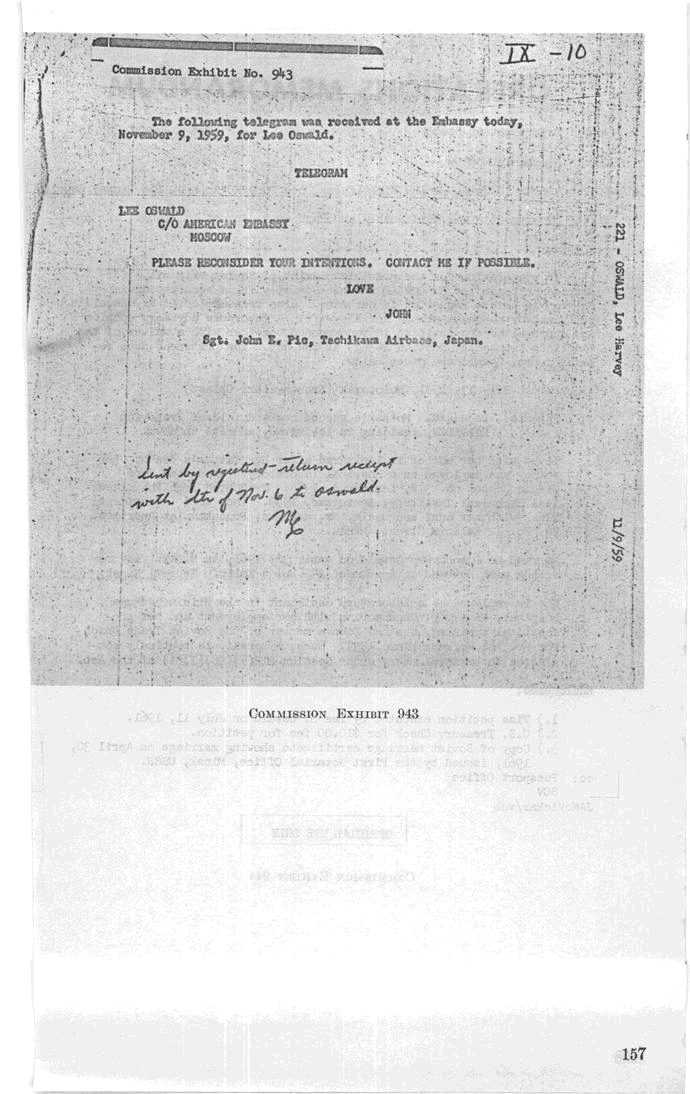

John Pic is Lee's half brother.

OSWALD'S Anti-Communist Speech (below)
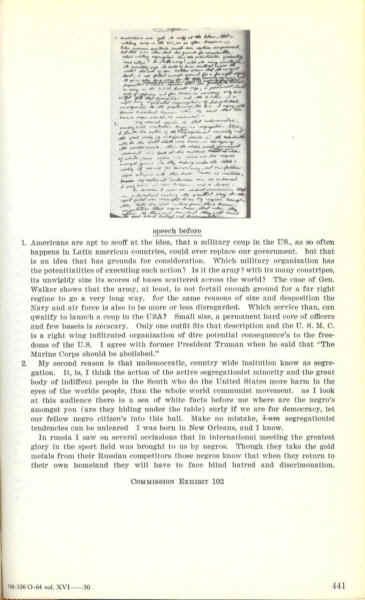
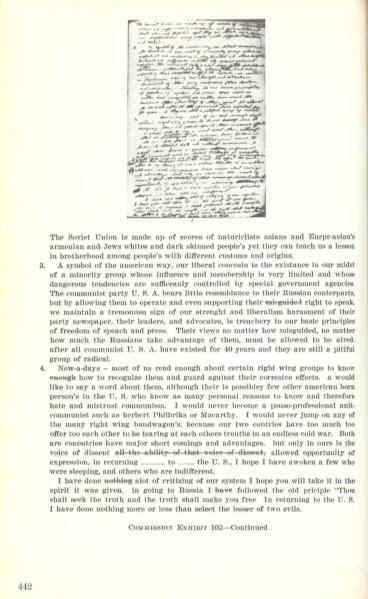
Even Ruby's Defense attorney knew Oswald was an FBI Informant.
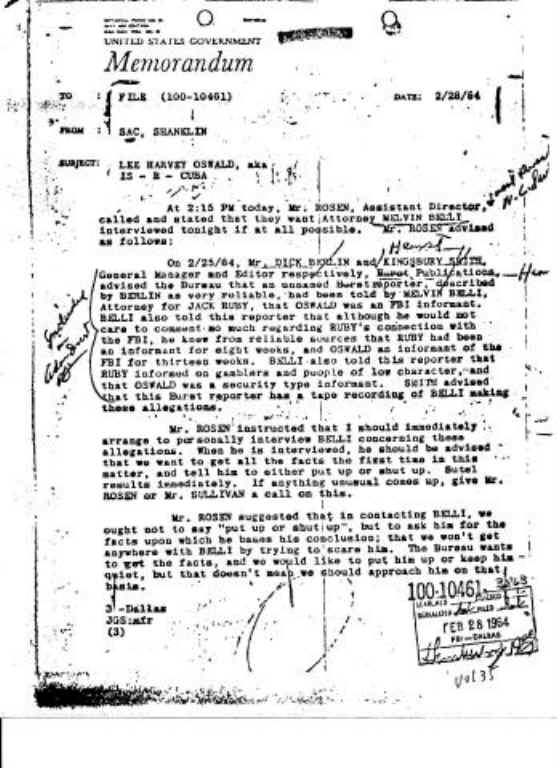
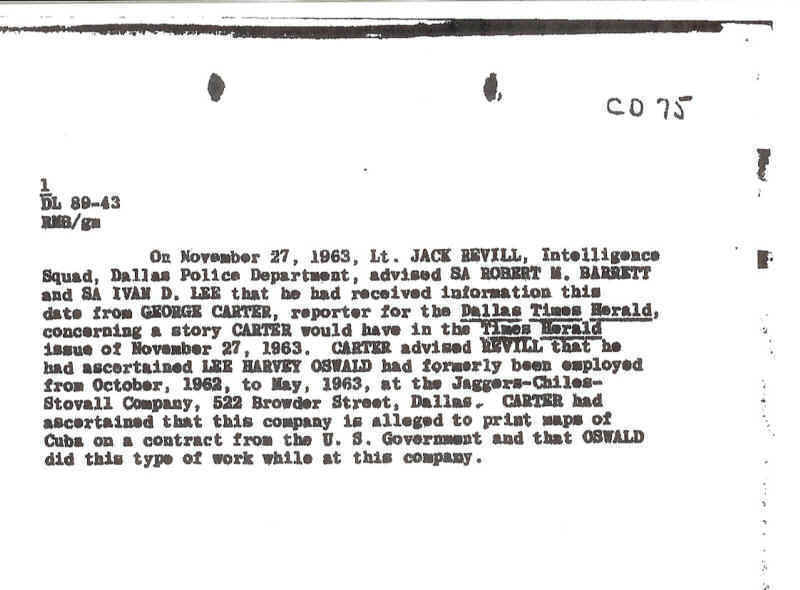
From: Bill Parker
Mail: wparker@kendaco.telebyte.com or compuserve ID No. 73664,37
To: JFK Researchers
Subj: Carver Gayton Documents
Dr. Gary Aguilar recently mailed out a fax he received:
Quote on:
DOCUMENT SUGGESTS FBI HAS BEEN HIDING INFORMATION ABOUT INFORMANT STATUS OF
PRESIDENT KENNEDY S ACCUSED ASSASSIN:
Rio de Janeiro -- A former FBI Special Agent -- in a 1975 sworn deposition to
congress --detailed internal FBI accounts of Lee Harvey Oswald's informant
status with the Bureau. Author John Newman found the affidavit in the National
Archives while researching OSWALD AND THE CIA (Carroll & Graf Publishers).
Misidentified due to filing errors, it is one of millions of documents kept
secret for nearly two decades until the passage of the JFK Records Act.
In a subsequent interview with Dr. Newman, that Special Agent, Carver Gayton,
drew attention to a later conflicting statement he made to congress.
Newman turned over the records and the substance of his interview with that
Special Agent to the JFK Records Review Board last year. The FBI is currently
appealing to President Clinton to block the Review Board's attempt to release
FBI documents concerning its informant activities.
Under the terms of the JFK Records Act, President Clinton must act by August 30.
Dr. Newman, attending an international conference on the JFK assassination in
Brazil, will brief the media on August 30 regarding the details of the
deposition, the interview, and how this fits with Oswald's activities in New
Orleans and Mexico City in the summer of 1963.
Quote off
I have obtained all the pertinent Gayton documents from the National Archives,
and they are included in this article you are reading. John Newman PhD, author
of "Oswald and the CIA" alerted me to their existence several months before his
above mentioned book was published, and I thank him for doing so. At that time
he was planning to include Mr. Gayton's story in his book. Later, for various
reasons, he changed he mind, and decided to "let the Review Board handle it".
It took several phone calls back and forth Mr. Tilley at the national archives,
and back to Mr. Newman, before I was able to actually get the documents. The
"filing error" mentioned above seems to be that the documents Mr. Newman found
had an "RG 233" (Record Group 233) stamp on them, which would indicate that they
were from the HSCA, when actually they are Senate (Church Committee) documents.
The NARA/JFK people told me that the Senate has not yet sent them the computer
database of Church Committee documents as they are required to by the JFK
Records Act of 1992, therefore making it difficult to search these documents.
I have sent hard copies to one prominent researcher, who in turn is sending them
to others. I purchased a scanner for the express purpose of doing OCR of
documents from the National Archives. This is my first "release" so to speak. If
any of you have JFK documents you would like me to scan and convert to a text
file send e-mail to the address at the beginning of this article. Tell me what
you want scanned and I'll tell you if I'm interested; it's a very labor
intensive process and I occasionally have other non-JFK related things to attend
to.
Gayton was a young FBI agent stationed in Kansas City, where Hosty had been
exiled by J. Edgar Hoover for having a "big mouth".
Gayton stated in a sworn affidavit to the Church Committee that Hosty had told
him that LHO had been "listed" as a "PSI", Potential Security Informant. He also
stated that LHO had been listed as a PSI by an older Dallas FBI agent who closed
the LHO PSI file after failing to develop any information. This older agent
retired just before Hosty moved to the Dallas office. He said that Hosty
re-opened this PSI file and was trying to develop LHO as a source but had not
actually had any contact with him. He was trying to get hold of him but could
not find him, according to what Hosty told Gayton.
I also have a 30 page transcript of a phone interview of James Gochenaur by HSCA
which I have not yet attempted to scan. About two lines at the top of each page
are obliterated by the "RG233" stamp, which is actually a little label plate
which is laid of the copier machine, so that it's imprint is left on each page
copied.
Gochenaur was the original lead who led investigators to Gayton. Gochenaur had
rented an apartment from Gayton in the early 1970's. He said that Gayton told
him that Hosty had told Gayton that LHO was an informant. He also had some
interesting things to say about a conversation he had with Secret Service agent
Elmer Moore. If I get some positive feedback from this article maybe I will be
motivated to scan and upload the Gochenaur document.
I will give you the documents in the order that I think will make the most
sense. The RIF (Record Identification Form) Number is giving at the beginning of
each document. You will need these numbers if you decide to obtain a copy from
the National Archives. I will point out what was deleted from the first draft of
Mr. Gayton's affidavit to the Church Committee, and analyze the somewhat
contradictory interview with the HSCA.
ATTENTION: Gayton's name has already been publicized, but I am going to delete
his address (it's old) and the names of some other people he mentioned as
possible leads to avoid possible legal action. Mr. Gayton is still alive. Please
do not harass him in any way. By no stretch of the imagination can I see Mr.
Gayton being involved in the assassination in any way. He is already the focus
of attention from several directions. As one of the first black FBI agent in an
organization led by a dedicated racist (Hoover) I'm sure he has suffered enough.
So I've censored any information I thought would help nosy people track him
down. In the place of this information you will see "[Censored/WTP]". That is me
doing the censoring. If you want to know what was there get the documents from
the National Archives yourself. Where the original (copy) document I have
contains blank spaces or "reductions" you will see "[blank]". That means I don't
know what was there either.
First the summary of Church Committee, which actually has the most information:
[RIF No. 157-10008-10025. This is the summary of the Senate (Church Committee)
interview of Mr. Gayton. Editorial comments in square brackets.]
SUMMARY OF AN INTERVIEW OF MR. CARVER GAYTON
ADDRESS: [Censored/WTP]
DATE: January 17, 1976 - 10:00 a.m. to 12:30 p.m.
INTERVIEWER: Patrick Shea of the Select Committee Staff
Mr. Gayton was with the FBI for four years - 1964 through 1968. He was trained
at headquarters in Washington and Quantico, Va., beginning in January of 1964.
His first assignment was Kansas City. He remained there for one year and then
was transferred to Philadelphia, Pa. He remained in Philadelphia until the fall
of 1967 when he took a job with Lockheed Corp. in Sunnyvale, Ca., as part of
their security guard.
Gayton was born and raised in [Censored/WTP]. He first became interested in
working for the FBI when his brother, who was working for the U.S. attorney in
[Censored/WTP], suggested he should apply to be an agent. The Kennedy
Administration had provided another impetus. When he joined the FBI in 10,64,
there were a total of 19 black agents.
Gayton's first assignment was in the criminal section of the Kansas City office
of the FBI. .He was placed in the interstate stolen motor vehicle squad. It was
in this squad that Gayton met Mr. Hosty. Hosty had been transferred from Dallas
to Kansas City and placed with this basic training squad.
Gayton stated that the first week Hosty was on the job he was walking down the
street and stopped in front of a well-known Mafia hangout. While Hosty stood
there, one of the Mafia members came
out and started yelling about "why was the FBI staking out his business
location?" The Mafia man made so much commotion that Gayton thinks there was
something written about the incident in the Kansas City newspaper. Gayton does
not recall any particular stake out where he and Hosty would have been together
as partners.
Gayton's service on the squad of which Hosty was a member overlapped with
Hosty's time of service by only one month.
After the above described events, Hosty, who had for his first impression seemed
quite self-righteous, loosened up with his fellow squad members. Gayton denied
ever covering up the Mafia incident for the Hosty. Gayton denied ever having
been the sole focus of Hosty's attention about details of Oswald's relationship
to the FBI. Instead, Gayton stated that it was a common practice for the squad,
contrary to FBI regulations, to leave their office and go out for a cup of
coffee. It was during these social coffee breaks that Hosty would discuss the
Oswald matter.
Gayton mentioned one background note on Hosty. Gayton stated that Hosty was a
very dedicated agent. Gayton stated that Hosty was unhappy about the transfer to
Kansas City from Dallas, but accepted it as a good soldier. The unhappiness
stemmed from the fact that one of Hosty's nine children had influenza and the
Doctor said the climate in Kansas City would not be good for the-child's health.
But, because the FBI ordered him to Kansas City, he went there.
Hosty mentioned to Gayton and other members of the squad that Oswald was first a
PSI for an older agent who retired just before Hosty moved to the Dallas office.
Gayton recalls that Hosty said that this older agent had had no contact with
Oswald. In fact, one of the last things the older agent did before he retired,
was to deactivate the Oswald file as a PSI. Hosty, coming new into the job, and
anxious to be promoted, decided to reopen the Oswald file as a PSI. Hosty, as
part of his effort to reopen the Oswald matter, told Gayton that he would leave
notes at Oswald's apartment urging him to get in touch with the FBI. Gayton said
that Hosty had commented that he had listed Oswald as a PSI, but that there had
been no contact with him. Gayton stated that, in his opinion, Hosty was not
Oswald's handler. Gayton felt that the FBI had been unsuccessful in establishing
that type of relationship with Oswald. The sole reason for listing Oswald as a
PSI, according to Gayton, was the pressure to produce statistics that would make
the Director pleased. Gayton cannot recall if Hosty ever commented as to whether
he had contacted Marina Oswald or Lee Harvey Oswald's mother.
Gayton does not recall Hosty ever mentioning a Post Office box drop for Oswald.
Gayton thought this went too far afield of the FBI regulations for Hosty to
consider doing it.
Gayton stated that he knew of no other U.S. Government personnel,
besides Hosty and the retired agent who had had contact with Oswald. Gayton
stated that he knew of no other U.S. citizen who had had contact with Oswald.
Gayton suggested that the Committee should try and contact the FBI agent who had
been responsible for placing Oswald in the PSI category.
Gayton stated that Hosty did comment, during one of their coffee breaks, on the
ineptness of the Dallas Police Department, in handling the entire case. Hosty
stated, according to Gayton, that on one occasion he had asked Dallas Police
Captain to see some of the bullet fragments removed from Kennedy's body. The
Captain opened up his desk drawer and began to rummage about for the material
re- quested. After some delay, he produced the fragments. Hosty commented to
Gayton that he felt it was impossible to establish an accurate chain of custody
for these shell fragments.
Gayton stated that there were two reasons why the conversations at coffee
frequently focused on the Kennedy assassination. The first, was that it had
occurred in the previous year and the Warren Commission still was investigating,
the topic was still timely. The second reason, from Gayton's point of view, was
that during his training at Quantico, in February and March of 1964, one agent
had given a lecture to Gayton's entire class on how the Kennedy assassination
was not a conspiracy. Gayton stated that this agent attempted to analyze the
entire assassination as the work of a lone assassin, Lee Harvey Oswald. Gayton
stated that he remembers this, because the lecture occurred approximately at the
same time that the Oswald gun was brought to Quantico to be test fired to
determine whether it was possible to fire the rifle as rapidly as Oswald would
have had to in order to be the lone assassin. The conclusion that resulted from
these tests, was that it was possible but extremely difficult.
Gayton does not recall Hosty mentioning anything about destroying evidence,
either by himself or by anyone else. Gayton does recall Hosty commenting on how
upset he had been at the manner in which the Dallas Police Department handled
the evidence. Gayton also recalls Hosty making some comments about the Police
Department's improper handling of Kennedy's body. Gayton had no first hand
knowledge about what the FBI's attitude was towards the Warren Commission.
Gayton stated that the people he worked with did not seem enthused about the
Warren Commission investigation. Gayton cannot say specifically that there was
agreement amongst the Bureau personnel to protect the image of the FBI. But, he,
Gayton, would not be surprised now, nor does he think he would have been then,
to find out that the "real" facts about the assassination were known to people
inside the Bureau, but these facts were never known to out- side groups like the
Warren Commission. Since Oswald was listed as a PSI at different times, he would
have been in the FBI records at headquarters in Washington. Gayton implies from
this that some of the FBI high officials, perhaps even Hoover, knew of Oswald's
existence and activities before the assassination. Gayton stated that he had no
knowledge about any FBI operation, in New Orleans, Miami, Texas, or elsewhere in
the South, that related to the Kennedy assassination or the subsequent
investigation into that matter. Gayton stated that he knew of no contacts
between the FBI and persons or organizations that would have had an interest in
seeing Kennedy assassinated. Gayton thought that the Select Committee had found
his name from interviewing other agents on the squad in Kansas City that he and
Hosty had been assigned to. It was only at the end of the interview that the
interviewer indicated the Select Committee source of information. Gayton did
indicate that he had rented an apartment to Gouchenhauer. Gayton recalled
several different times when he and his wife had had dinner with the
Gouchenhauers. He does not specifically recall the conversation described to the
Committee by Mr. Gouchenhauer. Gayton does recall receiving a letter from
Gouchenhauer in 1971. He does not recall the details of the letter. Gayton
thinks he did nothing as a result of the letter.
Gayton stated that there were a number of different reasons for his leaving the
Bureau. When he had first joined the Bureau he did not expect to spend his
lifetime there. One of the reasons for his departure was related to the general
attitude of the Bureau toward blacks.. As an illustration, Gayton mentioned an
agent in Philadelphia named [Censored/WTP]. Mr. [Censored/WTP], according to
Gayton, was in charge of the FBI's Philadelphia office's public relations. At
one point, during Gayton's stay in Philadelphia, [Censored/WTP] arranged for
Gayton to speak at a career day at Booker T.. Washington High School. The black
students at the high school were impressed to see a black FBI agent. Gayton
stated that he had told the students in the course of his presentation that one
of the reasons for his joining the Bureau was the Kennedy Administration. Gayton
stated that after the assembly was over Adams was very upset with Gayton.
[Censored/WTP] said that Hoover had always hired blacks in the Bureau. Gayton
was not invited to speak to another group after this incident.
In Philadelphia, Gayton had been placed on the fugitive squad. In that position
he handled criminal informants. At one point, near the end of his time with the
Bureau he stated that he was tired of arresting black people.
Gayton stated that he had no first hand knowledge about the King assassination.
Gayton had been told by some agents in Philadelphia of the materials the Bureau
had on Dr. King. He didn't feel that the agents were confiding this information
to him to seek his help in the King matter but more to test him as to what his
attitude was to a known Bureau activity. At the time the existence of the tapes
was made known to Gayton a public debate was occurring between King and Hoover.
Gayton felt that this was helpful. In fact, Gayton understood that at one point
King had asked for FBI protection. This was despite the fact that the FBI was
not a protective service.
Gayton stated that he had no first hand knowledge of the James Earl Ray. Gayton
denied any knowledge of the National States' Rights Party.
Gayton stated that as a result of recent revelations he had begun to question
whether the FBI had conducted a complete investigation on the King
assassination. The FBI kept Gayton, and most other black agents that Gayton
knew, out of any Bureau activities involved with surveillance with black
extremist activity. In 1965, Gayton interviewed the bodyguard of Malcolm X.
Gayton had heard at the time that the CIA was to have been involved in that
assassination, but Gayton never found anything to verify that allegation.
Malcolm X's bodyguard was a security informant for the Bureau. The bodyguard
claimed that another Moslem sect did the killing of ,Malcolm X. Gayton
speculated that the CIA might have been involved because of Malcolm X's foreign
activities.
Gayton stated that the FBI training program had been quite racist in its tone.
He did not know of any black agents involved in security matters for the Bureau.
He had been aware during his time in the Bureau that the NAACP and other
moderate civil rights groups were under surveillance. Gayton did a background
check on a black member of the U.S. Civil Rights Commission.
In Philadelphia, Gayton felt like he was purposely excluded from any activities
conducted by the Bureau involving blacks. He was aware, and did do some
interviewing for the Bureau, on their program of surveillance on the
Revolutionary Action Movement (RAM). Gayton was never aware of any of the covert
activities directed at King. He was aware of the tapes and other materials made
of King by the Bureau. Gayton thinks that the Bureau became particularly
concerned about King when King began speaking out against the Vietnam War. This
particular action further deteriorated the FBI's image of King.
Gayton stated that he had during his service in the Bureau had conversations
with different agents about the Bureau's activities in the South in the early
60's. One agent, a very active lawyer, said some local agents of the FBI were
right in the middle of the Klan and the local law enforcement people in the
South. Because the local FBI operation was so entwined with the local racist
institutions, the Bureau had sent agents from the North into the South to
fulfill certain tasks placed on the Bureau by the Justice Department.
Gayton does not recall hearing anything about the 1963 bombing in Birmingham,
Ala. The FBI, at the time, to Gayton, seemed very dedicated to wanting only to
pursue wrong doers. In retrospect, Gayton notes that in 1964 and '65 agents that
were sent to the South to handle civil rights disturbances were viewed by the
higher officials in the Bureau as troublemakers. Their assignment to trouble
spots was seen by one of Gayton's former bosses as one way of handling
troublemakers in the local office. Again, Gayton stated, that most black agents
were handling criminal matters and were not allowed into the security division.
Gayton has neither been contracted with nor employed by the FBI since 1967. Two
agents in the last two years have tried to contact him. One time they were
successful, and asked him if he would help them in keeping surveillance on local
black activities at the University of [Censored/WTP]. It was a time of campus
unrest and the agents felt that because of Gayton's position in the athletic
department he would be an excellent source of information. At that time, Gayton
felt his phone was tapped. He did call the FBI and they denied that the phone
was tapped. A second incident involving the Bureau and Gayton was when a friend
of a friend came to the University of [Censored/WTP] to be interviewed about
being a professor of communication. Gayton was suspicious of the individual's
behavior and called the Bureau for a check on this individual. It turned out
that he was a fugitive, and the Bureau went to his hotel and arrested him.
Gayton does have contact through his present employment with the University of
[Censored/WTP] with HEW. When Gayton was at [Censored/WTP], he had contact with
Air Force and Air Force security. Other than the above listed contacts, Gayton
has had no ongoing or relationships with any Government agency or department.
Gayton stated that he had not been in contact with anyone about any of the
subject matters that he was interviewed about by Select Committee staff. He
stated that from time to time in the last three or four years he had made
comments to individual friends as the topics arose. But, there had been no
specific conversation involving matters raised by the Select Committee staff.
Gayton did say that he had been contacted last year by the ex-FBI agent
association in [Censored/WTP]. They were inquiring of Gayton as to whether he
would join their organization. As a result of the recent revelations about the
King matter, he said he had no interest in doing it at all.
CONTACTS SUGGESTED BY GAYTON
Mr. [Censored/WTP], a judge in [Censored/WTP]. Mr. [Censored/WTP] was in the
same squad Mr. Gayton and Mr. Hosty were in. Mr. Gayton believed that Mr.
[Censored/WTP]'s time with 'Mr. Hosty in Kansas City was longer than his, and
therefore might have more information about Hosty.
Mr. [Censored/WTP], formerly with the FBI office in Philadelphia, present
location unknown. Mr. Gayton stated that Mr. [Censored/WTP] seemed to know a
[The document is blank here]
Mr. [Censored/WTP]. Gayton believed that he was special assistant in the Los
Angeles FBI office. He was head of Gayton's squad in Philadelphia and was the
one who most frequently articulated the purpose of the Bureau to Gayton and
other junior agents. Gayton thought he might know more about what activities the
Bureau had directed against King.
Mr. [Censored/WTP]. He is now head of the school board in [Censored/WTP], and is
a lawyer. He was in Gayton's class at Quantico and was one of the first black
agents.
Mr. Bill [blank] (Gayton did not know his last name) is presently the Sheriff of
[Censored/WTP]. He was in Gayton's class at Quantico. At the time of the King
matter this individual had been in the Justice Department and had been at the
school house door when Wallace had confronted the Federal officials. He was an
ex-New York cop and seemed to know a great deal about the relationship between
the FBI and the Justice Department.
Mr. [Censored/WTP], present address unknown, but he was Gayton's partner in
Kansas City, he is an ex-New York cop. Because of his assignment in Kansas City,
he might be able to offer the Select Committee more information on comments made
by Hosty. Gayton mentioned [Once again the document goes blank]
Mr. [blank] [Censored/WTP], who was with the FBI in their Los Angeles office. He
was in Gayton's class at Quantico. He came to [Censored/WTP] to visit the
President of the [Censored/WTP] Community College in the last three or four
years. Gayton thought that he might have some further observations about the
FBI's activities involving surveillance on black groups and possibly on Martin
Luther King. Gayton mentioned a
Mr. [blank] [Censored/WTP]. He had been with the Bureau for 30 years and then
for some unknown reason was demoted. He is now with the Treasury Department.
Gayton believes he still lives in [Censored/WTP]. At the time he was demoted the
Bureau gave him the option of being assigned to Mississippi or resigning. He
chose to resign. Gayton thought that from his long standing experience with the
Bureau he might be able to offer the Committee some leads into the Martin Luther
King case.
[END OF DOCUMENT]
Some of the interesting point in the above document:
1. "Hosty mentioned to Gayton and other members of the squad that Oswald was
first a PSI for an older agent who retired just before Hosty moved to the Dallas
office." Of course this older agent "never had any contact with him". Who was
this older agent? Gayton felt that the committee should try to contact him.
2. "Hosty, as part of his effort to reopen the Oswald matter, told Gayton that
he would leave notes at Oswald's apartment urging him to get in touch with the
FBI." I don't believe there is any record of Hosty leaving notes at Ruth Paine's
house. Someone please correct me if I am wrong about this. Hosty supposedly did
not know of "O.H. Lee"'s apartment on North Beckley St. Even Oswald's wife did
not know where he was staying. Hosty's inability to locate LHO did not begin
here. Please read pg.s 290-299 of chapter 16 of "Oswald in New Orleans" for the
interesting story of one seemingly innocuous paragraph of a Hosty memo which was
only revealed in 1994 after being "redacted" for thirty years.
3. "Since Oswald was listed as a PSI at different times, he would have been in
the FBI records at headquarters in Washington". This would mean that Hoover lied
to the Warren Commission when he stated the "no attempt was made to recruit him
[LHO] in any capacity". Watch this idea disappear from the final affidavit
before Gayton signs it.
4. "Malcolm X's bodyguard was a security informant for the Bureau." This also
will disappear from the final affidavit.
5. "...some local agents of the FBI were right in the middle of the Klan and the
local law enforcement people in the South. Because the local FBI operation was
so entwined with the local racist institutions, the Bureau had sent agents from
the North into the South to fulfill certain tasks...". Take it for what it's
worth.
On to the next document:
[RIF no. 157-10008-10024. This is apparently a first draft, unsigned, of
Gayton's affidavit to the Church Committee. There are some significant
differences when compared to the signed version.]
SELECT COMMITTEE TO STUDY GOVERNMENTAL OPERATIONS WITH RESPECT TO INTELLIGENCE
OPERATIONS
-------------------------
Re: Mr. Carver Gayton : AFFIDAVIT
-------------------------
I, Carver Gayton, being duly sworn, hereby deposes and says :
I was a Special Agent with the Federal Bureau of Investigation from 1964 through
1967. I was trained at both FBI Headquarters in Washington, and at Quantico,
Virginia; my training beginning in January of 1964. My first office assignment
was in Kansas City. I remained there for one year and was then transferred to
Philadelphia, Pennsylvania. I remained in Philadelphia until the fall of 1967,
when I took a position with [Censored/WTP] Corporation in Sunnyvale, California,
as part of their security guard. I am presently residing in [Censored/WTP] where
I am completing my PhD in political science and working
for the University of [Censored/WTP].
My first assignment within the Bureau was in the Criminal Section of the Kansas
City Office, and more specifically, the Interstate Stolen Motor Vehicle Squad.
It was in this squad that I met Jim Hosty.
I recall that sometime during the first week of Hosty's working with our squad
in Kansas City, he was walking down the street when he stopped in front of a
well-known "Mafia" hangout. While Hosty stood there, a known "Mafia" figure came
out and started yelling about "Why was the FBI staking out his business
location." The man made a great deal of commotion; I believe there was something
written about the incident in the Kansas City newspaper. I do not recall any
particular stakeout where Hosty and I would have been together as partners. My
service on the squad in Kansas City overlapped with Hosty's for only one month.
Our squad often had coffee together outside the office, a practice which I
believe is contrary to FBI regulations. It was during these frequent social
coffee breaks that Hosty discussed the Oswald case and the President's
assassination with the squad members present.
Hosty stated to me and other members of the squad that Oswald had been a PSI
(potential security informant)-for an older agent who retired just before Hosty
moved to the Dallas office. Hosty told us that this older agent had had no
contact with Oswald, and that one of the last acts the older agent did before he
retired was to deactivate the Oswald file as a PSI. According to Hosty, when he
came into his new job in Dallas, he decided to reopen the Oswald file as a PSI.
Hosty commented that as part of his effort to reopen the Oswald matter, he left
notes at Oswald's apartment, urging him to get in touch with the FBI. I recall
Hosty commenting that although he had listed Oswald as a PSI, he had not had any
contact with him. Based upon my experience with the Bureau, it is my opinion
that since Oswald had been listed as a PSI at different times, his name would
have been listed in FBI Headquarters informant records.
I have no recollection of Hosty ever stating whether or not he had contacted
Marina Oswald or Lee Harvey Oswald's mother. I do not recall Hosty ever
mentioning a post office box drop for Oswald.
I know of no other U.S. government personnel besides Hosty and the retired agent
who had contact with Oswald. I know of no other U.S. citizen who had had contact
with Oswald.
I recall that there were two reasons why our squad's conversations over coffee
frequently focused on Oswald and the Kennedy assassination while I was with the
squad in Kansas City. First, it was only a year earlier that Kennedy had been
assassinated, and the Warren Commission was still investigating the topic.
Second, when I was being trained at Quantico in February and March of 1964, one
agent gave a lecture to my entire class on how the Kennedy assassination was not
a conspiracy. I recall that this agent attempted to analyze the entire
assassination as the work of a lone assassin, Lee Harvey Oswald. I recall that
at approximately the same time of the lecture, Oswald's gun had been brought to
Quantico to be test-fired to determine whether it was possible to fire the rifle
as rapidly as Oswald would have had to in order to be the lone assassin. I
believe that these tests showed that although it was possible, it would have
been extremely difficult.
I do recall Hosty commenting that the Dallas Police Department had been rather
inept in their handling of the entire Kennedy assassination question. Hosty
recounted that on one occasion he had asked the Dallas Police captain to show
him some of the bullet fragments removed from President Kennedy's body. The
captain opened up his desk drawer, according to Hosty, and began to rummage
about for the material requested. After some delay, the fragments were produced.
Hosty commented to me that he felt it was impossible to establish an accurate
chain of custody for these shell fragments. I also remember Hosty commenting
upon the Dallas Police Department's improper handling of President Kennedy's
body. I do not recall Hosty or anyone else mentioning the destruction of
evidence in connection with Oswald or the assassination investigation.
I have no firsthand knowledge of the FBI's investigation into the assassination
of Dr. Martin Luther King. I have been told during my time in the Bureau by some
agents in Philadelphia of certain materials -- including tape recordings -- that
the Bureau had on Dr. King. At the time, I did not feel that the agents were
confiding this information to me in order to seek my assistance in any matter
related to the Bureau's activity involving Dr. King. I believe that this
material was conveyed to me more as a test as to what my attitude was toward
these activities being directed by the me, a public debate was occurring between
Dr. King and Mr. Hoover. I thought this was a helpful and healthy thing.
In 1965 I interviewed the bodyguard of Malcolm X. I had heard at the time that
the CIA was alleged to have been involved in the assassination of Malcolm X. I,
in the course of my investigation, never found anything that would verify this
allegation. Malcolm X's bodyguard was a security informant for the Bureau, and
it was for this reason I was interviewing him. The bodyguard, in the course of
our interview, claimed that another Muslim sect had killed Malcolm X.
In Philadelphia I felt as if I were purposely excluded from activities being
conducted by the Bureau involving blacks. I was aware and did some interviewing
for the Bureau on their program of surveillance of the Revolutionary Action
Movement (RAM). I was never aware, during my time with the Bureau, of any of the
covert activities directed at Dr. King. As I stated earlier, I was aware of
tapes and other materials made of Dr. King by the Bureau. I believe that the
Bureau became particularly concerned about Dr. King when he began speaking out
against the Vietnam war.
I have neither been connected with nor employed by the Federal Bureau of
Investigation since 1967. Aside from isolated comments to my friends over the
last three or four years, I have not discussed the matters set forth in this
affidavit with anyone other than the staff member of the Senate Select Committee
on Intelligence Activities who met with me in [Censored/WTP] on Saturday,
January 17,1976. This meeting was requested by the Committee; my appearance and
statements were entirely of a voluntary nature.
Carver Gayton
Sworn to before me this ____ day of __________, 1976.
[END OF DOCUMENT]
Take note of the following in the above document:
1. "Malcolm X's bodyguard was a security informant for the Bureau."
2. "Based upon my experience with the Bureau, it is my opinion that since Oswald
had been listed as a PSI at different times, his name would have been listed in
FBI Headquarters informant records."
Now read the final, signed affidavit:
[RIF no. 157-10002-10267. This is the final, signed version of Gayton's
affidavit to Church Committee.]
SELECT COMMITTEE TO STUDY GOVERNMENTAL OPERATIONS WITH RESPECT TO INTELLIGENCE
OPERATIONS
Re: Mr. Carver Gayton : AFFIDAVIT
I, Carver Gayton, being duly sworn, hereby deposes and says:
I was a Special Agent with the Federal Bureau of Investigation from 1964 through
1967. I was trained at both FBI Headquarters in Washington, and at Quantico,
Virginia; my training beginning in January of 1964. My first office assignment
was in Kansas City. I remained there for one year and was then transferred to
Philadelphia, Pennsylvania. I remained in Philadelphia until the fall of 1967,
when I took a position with [Censored/WTP]Corporation in Sunnyvale, California,
as a security representative. I am presently residing in [Censored/WTP] where I
am completing my PhD in political science and working for the University of
[Censored/WTP].
My first assignment within the Bureau was in the Criminal Section of the Kansas
City Office, and more specifically, the Interstate Stolen Motor Vehicle Squad.
It was in this squad that I met Jim Hosty.
I recall that sometime during the first week of Hosty's working with our squad
in Kansas City, he was walking down the street when he stopped in front of a
well-known "Mafia" hangout. While Hosty stood there, an alleged "Mafia" figure
came out and started yelling about "why was the FBI staking out his business
location." Or words to that effect. The man made a great deal of commotion; I
believe there was something written about the incident in the Kansas City
newspaper. I do not recall any particular stakeout where Hosty and I would have
been together as partners. My service on the squad in Kansas City overlapped
with Hosty's for about one month.
At times members of our squad had coffee together outside the office. It was
during a couple of these coffee breaks that Hosty discussed the Oswald case and
the President's assassination with the squad members present.
Hosty stated to me and other members of the squad that Oswald had been a PSI
(potential security informant) for an older agent who retired just before Hosty
moved to the Dallas office. Hosty told us that this older agent had had no
contact with Oswald, and that one of the last acts the older agent did before he
retired was to deactivate the Oswald file as a PSI. According to Hosty, when he
came into his new job in Dallas, he decided to reopen the Oswald file as a PSI.
Hosty commented that as part of his effort to reopen the Oswald matter, he left
notes at Oswald's apartment, urging him to get in touch with the FBI. I recall
Hosty commenting that although he had listed Oswald as a PSI, he had not had any
contact with him.
I have no recollection of Hosty every stating whether or not he had contacted
Marina Oswald or Lee Harvey Oswald's mother. I do not recall Hosty ever
mentioning a post office box drop for Oswald.
I know of no other U.S. government personnel besides Hosty and the retired agent
who had contact with Oswald. I know of no other U.S. citizen who had had contact
with Oswald.
When I was being trained at Quantico in February and March of 1964, one agent
gave a lecture to my entire class on how the Kennedy assassination was not a
conspiracy. I recall that this agent attempted to analyze the entire
assassination as the work of a lone assassin, Lee Harvey Oswald. I recall that
at approximately the same time of the lecture, Oswald's gun had been brought to
Quantico to be test-fired to determine whether it was possible to fire the rifle
as rapidly as Oswald would have had to in order to be the lone assassin. I
believe that these texts showed that although it was possible, it would have
been extremely difficult.
I do recall Hosty commenting that the Dallas Police Department had been rather
inept in their handling of the entire Kennedy assassination question. Hosty
recounted that on one occasion he had asked the Dallas Police captain to show
him some of the bullet fragments removed from President Kennedy's body. The
captain opened up his desk drawer, according to Hosty, and began to rummage
about for the material requested. After some delay, the fragments were produced.
Hosty commented to me that he felt it was impossible to establish an accurate
chain of custody for these shell fragments. I also remember Hosty commenting
upon the Dallas Police Department's improper handling of President Kennedy's
body. I do not recall Hosty or anyone else mentioning the destruction of
evidence in connection with Oswald or the assassination investigation.
I have no firsthand knowledge of the FBI's investigation into the assassination
of Dr. Martin Luther King. I have been told during my time in the Bureau by some
agents in Philadelphia of certain materials -- including tape recordings -- that
the Bureau had on Dr. King. At the time, I did not feel that the agents were
confiding this information to me in order to seek my assistance in any matter
related to the Bureau's activity involving Dr. King. At the time the existence
of the tapes was made known to me, a public debate was occurring between Dr.
King and Mr. Hoover. I thought this was a helpful and healthy thing.
In 1965 I was requested to sit in on an interview with a former bodyguard of
Malcolm X. I had heard at the time that the CIA was alleged to have been
involved in the assassination of Malcolm X. I did not know of anything that
would verify this allegation. I believe, the bodyguard, in the course of our
interview, claimed that another Muslim sect had killed Malcolm X. It should be
noted that the bodyguard did not appear to be emotionally, stable.
In Philadelphia I was not assigned cases or activities being conducted by the
Bureau involving the black movement. I was never aware, during my time Keith the
Bureau, of any of the covert activities directed at Dr. King. As I stated
earlier, I was aware of tapes and other materials made of Dr. King by the
Bureau. I believe that the Bureau became Particularly concerned about Dr. King
when he began speaking out against the Vietnam war.
I have neither been connected with nor employed by the Federal Bureau of
Investigation since 1967. Aside from isolated comments to my friends over the
last three or four years, I have not
discussed the matters set forth in -this affidavit with anyone other than the
staff member of the Senate Select Committee on Intelligence Activities who met
with me in [Censored/WTP] on Saturday, January 17, 1976. This meeting was
requested by the Committee; my appearance and statements were entirely of a
voluntary nature.
Carver Gayton
Sworn to before me this 30th day of January, 1976
[Signature of Notary]
[END OF DOCUMENT]
Note the omission of the "Malcolm X bodyguard was an informant" and the
"headquarters would have a PSI file on LHO" data.
I find it suggestive that although Gayton has stated that neither the retired
agent who first listed LHO as a PSI nor Hosty ever actually had "any contact"
with LHO, he feels it necessary to add this sentence:
"I know of no other U.S. government personnel
besides Hosty and the retired agent who had
contact with Oswald."
Now for the final brief (one page)document:
[RIF No. 180-10108-10187. This is the summary of the HSCA interview with Gayton.
I have not been able to locate a transcript, only this summary.]
Memorandum To: Robert K.. Tanenbaum
From: Howard M. Gilbert and Jack Moriarity
Re: Interview of Carver Gayton
Date: June 1, 1977
On May 21, 1977 we interviewed Carver Gayton at his apartment situated at
[Censored/WTP]. His phone number at home is [Censored/WTP]. He is presently
terminating his employment with the University of [Censored/WTP]. His present
work number is ([Censored/WTP]. He plans to teach at [Censored/WTP] in the fall.
Gayton was polite but guarded. He impressed as a very intelligent man, but one
who was not about to admit that he heard or said anything derogatory about the
F.B.I.
Gayton was to be interviewed about alleged conversations he had had with James
Hosty in Kansas City when they were agents together. An informant, James
Gochenaur, (see separate memo and transcript re his interview) had stated that
while at the University of [Censored/WTP] he rented an apartment from Gayton and
they discussed JFK and James Hosty. Gochenaur stated that Gayton had said that
Hosty told him that LHO was a paid FBI informant and that he had failed to make
a drop or get information and thereafter Hosty went looking LHO. Gayton admitted
talking with Gochenaur but says he is somewhat of a flake and was an
assassination buff when they met in [Censored/WTP]. Gayton denies telling
Gochenaur anything other than that he knew Hosty in Kansas City. Gayton denies
that Hosty ever told him anything at all about LHO and certainly not that LHO
was an FBI agent. Gayton gave an affidavit to the Church Committee. The only
thing Hosty told Gayton about LHO was that the file had been closed and that
Hosty had reopened it trying to develop some information but had been
unsuccessful.
[END OF DOCUMENT]
In this short document Gayton contradicts himself. It says "Gayton denies that
Hosty ever told him anything at all about LHO". Then one sentence later we have:
"The only thing Hosty told Gayton about LHO was that the file had been closed
and that Hosty had reopened it trying to develop some information but had been
unsuccessful." This is a flat out lie, unless we are to believe Gayton was lying
in his sworn affidavit to a Senate Committee.
He also denies that he ever told Gochenaur anything: "Gayton denies telling
Gochenaur anything other than that he knew Hosty in Kansas City." Any open
minded person who reads the 30 page transcript of the Gochenaur interview will
probably feel differently.
A Jesuitical sentence providing plausible denial: "Gayton denies that Hosty ever
told him anything at all about LHO and certainly not that LHO was an FBI agent."
This is quite the straw man. Gochenaur never said that Gayton told him that LHO
was an "FBI agent". An "Agent", more correctly "Special Agent", in FBI parlance
indicates a card-carrying, on the payroll, full fledged G-Man. Unlike the CIA,
where agent denotes a mere pawn in the espionage game, and NEVER a CIA Officer.
Gochenaur only claimed that Gayton said that LHO was an INFORMANT for the FBI,
not an AGENT.
This last document we have examined has the look of a definite cover-up on the
part of the HSCA, IF (and I emphasize IF) the interviewers were already familiar
with the Church Committee documents we have seen regarding Gayton. If they were,
then either they and Gayton agreed to put the cat back in the bag (those secret
senate documents will never come to light, right?). After all Gayton was not
under oath this time. John Newman has told me that he felt that Gayton was
possibly liable to prosecution under a federal law against making "false
official statements" which would cover any statements made to a HSCA
investigator. However I have since discovered that the statute of limitations on
this is five years.
I don't know what the statute of limitations is on perjury regarding sworn
statements to Senate Committees, but I wonder who is the man in the Justice
Department that Mr. Newman feels has the testicular fortitude to open the
king-size can of worms that would result from any sort of attempt to prosecute
Mr. Gayton. Can you imagine the trial where they would have to prove that Gayton
lied (When he said that Hosty told him LHO was "listed" as a PSI)? His lawyers
would have to show that he told the truth! Hosty would be subpoena!
Or maybe Gayton told the same story and the HSCA guys "modified" it slightly in
their "summary". After all the last sentence basically tells the same story in
Gayton's Church Affidavit (kinda sorta) while leaving out the dreaded word
"informant" or the more technical term "PSI". "The only thing Hosty told Gayton
about LHO was that the [PSI]file had been closed and that Hosty had reopened it
trying to develop some information [through Potential Informant LHO] but had
been unsuccessful.
However the sneaky, non-sequitur manner in which the HSCA interposed the
sentence: "Gayton gave an affidavit to the Church Committee.", as if that is all
there is to say about that, is highly suspicious. They do not record that they
asked Gayton what he said in that affidavit. If they had read it, they neglected
to confront him with the contradictions.
Howard Gilbert, one of the authors of the HSCA summary of interview, was the man
who did the telephone interview of James Gochenaur, the transcript of which runs
to 30 double-spaced pages. It is hard to believe Gochenaur's allegations could
be dismissed with this feeble attempt at an interrogation of Gayton, assuming
the "summary" truly indicates what transpired in the interview.
Consider this new revelation in the light of the following:
1. Hosty's name, phone number, and auto license plate number was found in LHO's
notebook.
2. The FBI provided the Warren Commission a listing of the contents of LHO's
notebook which omitted the name of James Hosty.
3. LHO walked into the Dallas office of the FBI and asked for "SA Hosty". When
told Hosty was not available he gave the receptionist a note. Hosty admitted
under oath to destroying the note, under orders of the Special Agent In-Charge,
Gordon Shanklin. We will never know what was in the note. The only accounts of
it are Hosty's and the receptionist's and they do not agree. Gordon Shanklin
testified that he knew nothing about any note. According to the HSCA Report Mr.
Shanklin stated that he "never even heard of Oswald until the assassination".
I find this extremely hard to believe and highly suspicious, especially since
his field office had the responsibility of keeping the LHO security file, and
his office forwarded Hosty's reports on LHO to FBI HQ, undoubtedly under
Shanklin's signature. Shanklin's office had responsibility for LHO at the time
of the Mexico City affair, which generated a significant amount of message
traffic, some of which must have crossed Shanklin's desk and attracted his
attention.
I could go into the Will Hayden Griffin story (another FBI agent who allegedly
said that LHO was "definitely a paid informer", or the Elrod story which will be
the subject of the La Fontaines book "Oswald Talked" out in December 1995, but I
think this is enough for now.
What do you think?
Oswald was there DURING the Cuban Missle Crises

Couple this page with >>> http://whokilledjfk.net/lho.htm
AT ONE POINT OSWALD HIRED A STENOGRAPHER TO TYPE UP HIS NOTES PAULINE BATES SHE BELIEVED HE WAS HINTING TAT HE WAS A SPY FOR THE U. S. GOVERNMENT ! ! ! SEE>>> https://www.youtube.com/watch?v=Hlnp0HfhLv
Page Visited
Times


